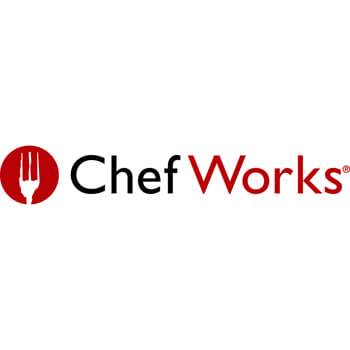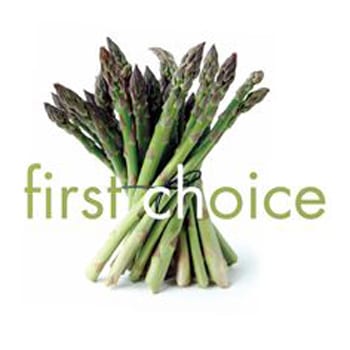Sustainability & Carbon Workshop Held at Bournemouth & Poole College in Partnership with NHS England and The Chefs’ Forum to Shape the Future of Healthcare Foodservice
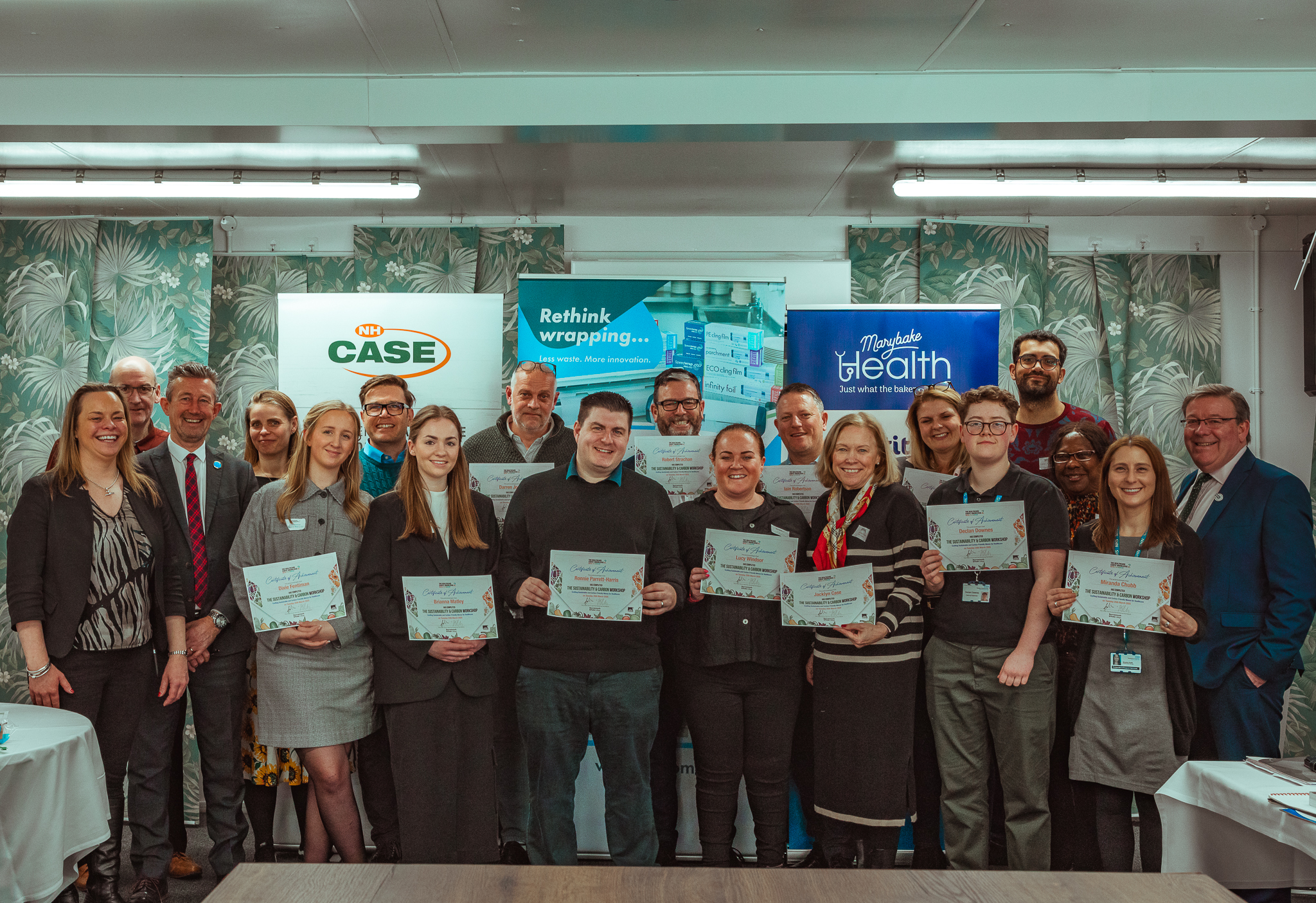 Bournemouth, 25 March 2025 – Bournemouth & Poole College kindly hosted the final workshop in a six-part national series focused on sustainability and carbon reduction within healthcare foodservice. Delivered in collaboration with NHS England and The Chefs’ Forum, the workshop marked a significant step in preparation for the upcoming second edition of The Healthcare Chefs’ Knowledge— The Healthcare Chefs’ Knowledge 2: Eating The Rainbow—with a sharpened focus on helping NHS England and its chefs, Catering Managers and Foodservice Stakeholders achieve net zero targets by 2030.
Bournemouth, 25 March 2025 – Bournemouth & Poole College kindly hosted the final workshop in a six-part national series focused on sustainability and carbon reduction within healthcare foodservice. Delivered in collaboration with NHS England and The Chefs’ Forum, the workshop marked a significant step in preparation for the upcoming second edition of The Healthcare Chefs’ Knowledge— The Healthcare Chefs’ Knowledge 2: Eating The Rainbow—with a sharpened focus on helping NHS England and its chefs, Catering Managers and Foodservice Stakeholders achieve net zero targets by 2030.
Phil Shelley, Senior Operational & Policy Manager for NHS England, reflected on the significance of the event
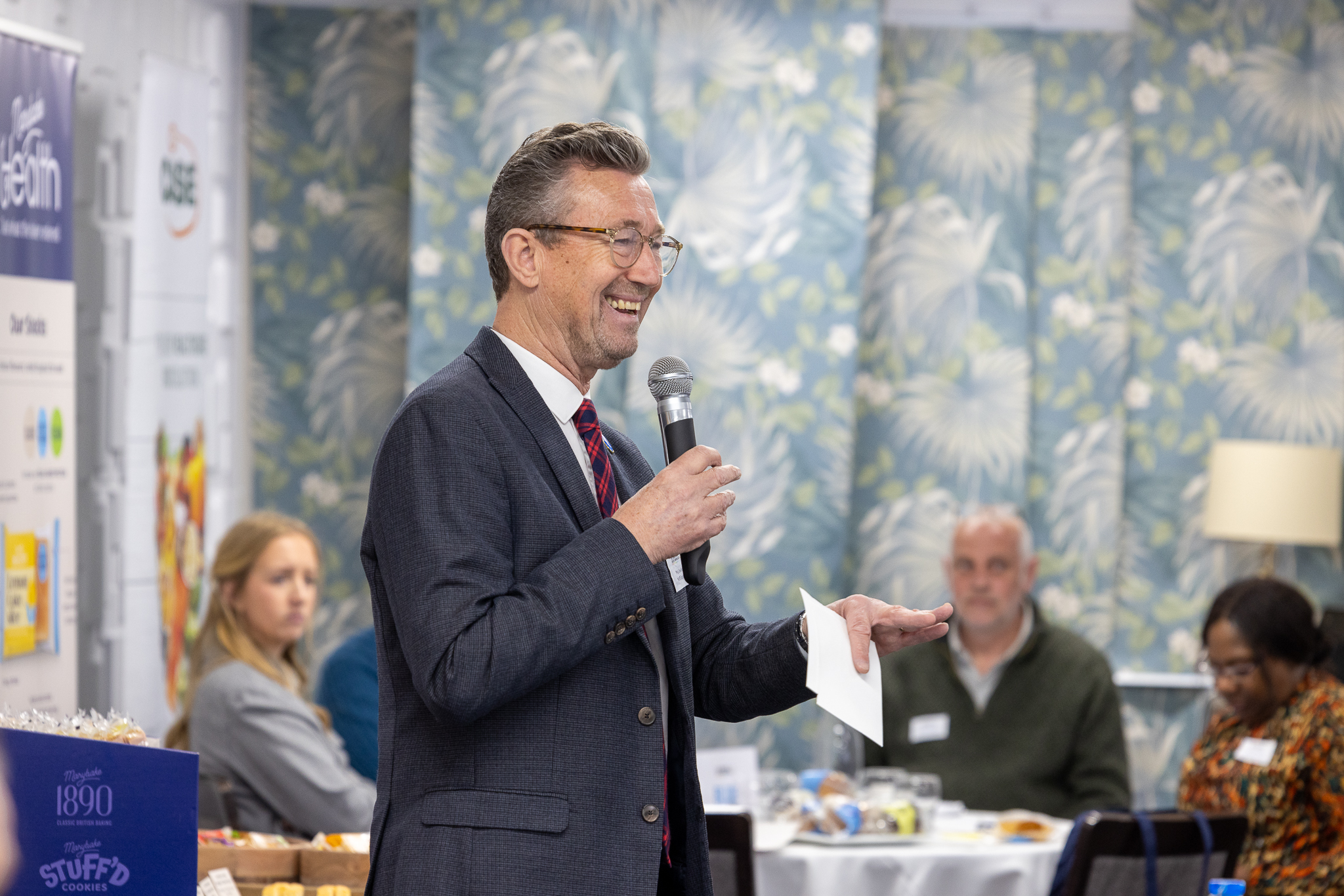 “The Sustainability Workshop in Bournemouth & Poole was the last in our current series of six, and it perfectly encapsulated the collaboration between healthcare and education. From suppliers to chefs, we are united in our mission to drive sustainable change in healthcare foodservice. The insights from all six sessions will now be shaped into a practical strategy, which we look forward to sharing in THCK2: Eating the Rainbow.”
“The Sustainability Workshop in Bournemouth & Poole was the last in our current series of six, and it perfectly encapsulated the collaboration between healthcare and education. From suppliers to chefs, we are united in our mission to drive sustainable change in healthcare foodservice. The insights from all six sessions will now be shaped into a practical strategy, which we look forward to sharing in THCK2: Eating the Rainbow.”
The latest interactive session brought together an inspiring mix of thought leaders and sustainable, carbon-conscious suppliers who are kindly sponsoring the book’s publication, as well as innovators from across healthcare catering and sustainability sectors, including Andrea Zick, Ph.D. researcher at the UK Food Systems Centre for Doctoral Training. Together, they explored actionable strategies to reshape NHS menus for the future, prioritising nutrition, carbon-conscious sourcing, and food at the heart of recovery and well-being.
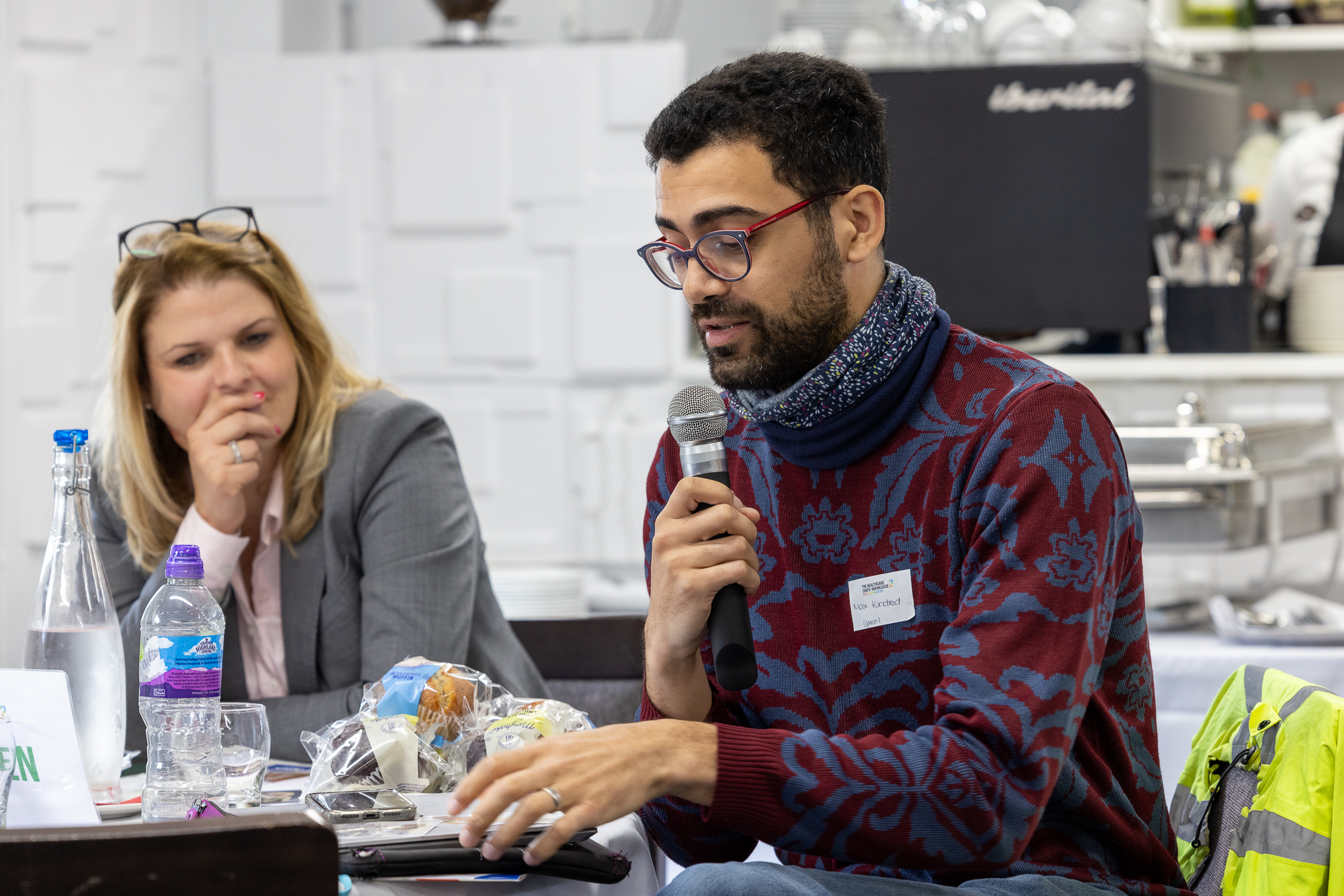 Max Kindred, Net Zero Senior Insight Manager at NHS England was delighted to attend the event, he said
Max Kindred, Net Zero Senior Insight Manager at NHS England was delighted to attend the event, he said
“It was great to see some of the country’s biggest and best catering operations present today. We got fantastic input from all of the Catering Managers, chefs, suppliers and sustainability leads who attended, as well as a great turnout from NHS Supply Chain. It was also really insightful to get a wider perspective on food systems across NHS Trusts in Dorset and Hampshire.”
Bryony Barlow from Wrapex presented on the recyclability and high quality of new film and foil rolls, offering more sustainable packaging solutions for NHS catering, she said
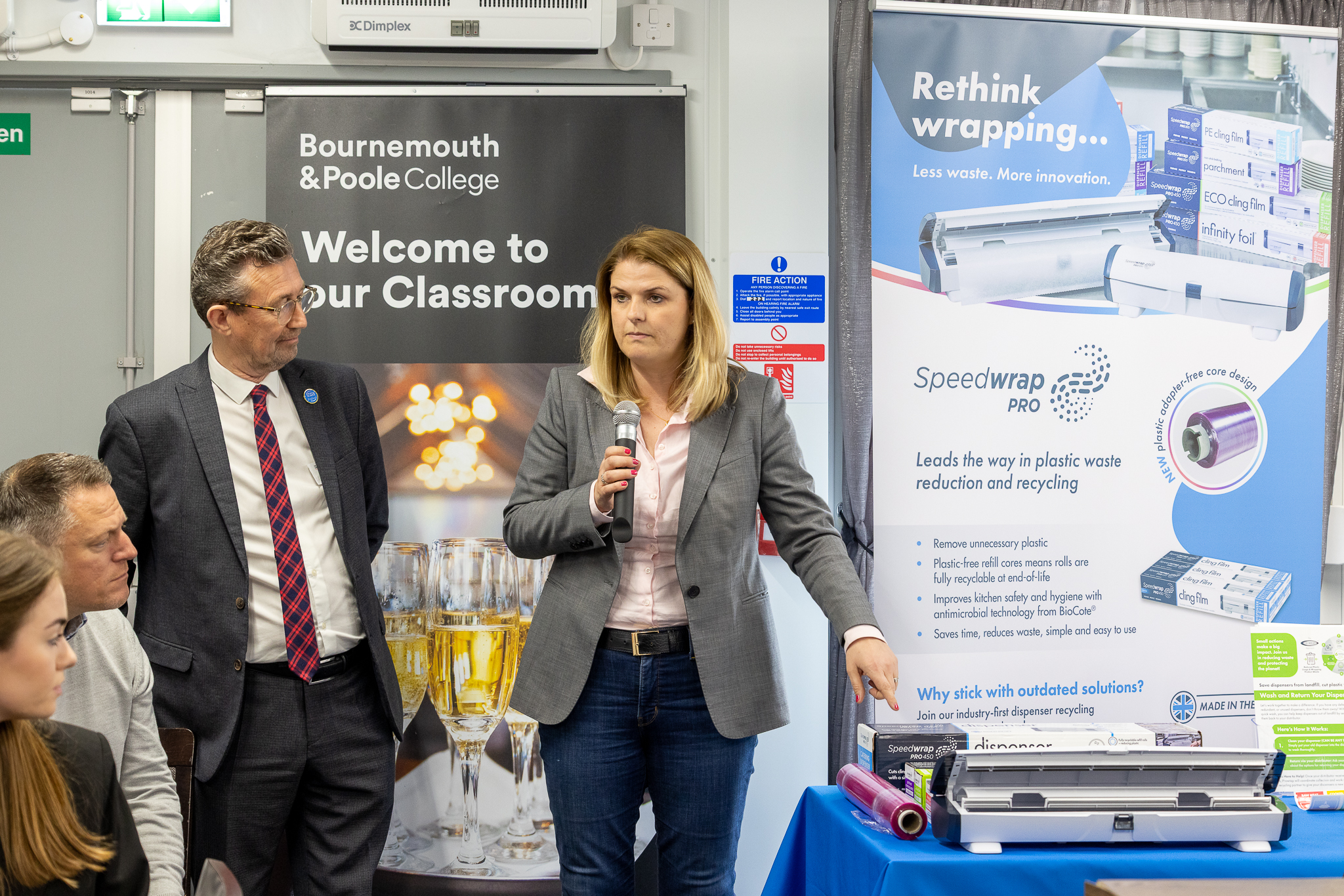 “It has been so interesting learning about all of the sustainability initiatives being implemented across NHS England and we are delighted to be Headline Sponsors of The Healthcare Chefs’ Knowledge 2: Eating The Rainbow. At Wrapex, with our Speedwrap Pro dispensing system, we can certainly connect with some of the initiatives in lowering carbon emissions and helping healthcare kitchens to become more sustainable . We have moved all of our production back to the UK, we’ve also introduced plastic-free refill rolls, which are now fully recyclable, together with our Eco cling film range, which is a PVC cling film roll.”
“It has been so interesting learning about all of the sustainability initiatives being implemented across NHS England and we are delighted to be Headline Sponsors of The Healthcare Chefs’ Knowledge 2: Eating The Rainbow. At Wrapex, with our Speedwrap Pro dispensing system, we can certainly connect with some of the initiatives in lowering carbon emissions and helping healthcare kitchens to become more sustainable . We have moved all of our production back to the UK, we’ve also introduced plastic-free refill rolls, which are now fully recyclable, together with our Eco cling film range, which is a PVC cling film roll.”
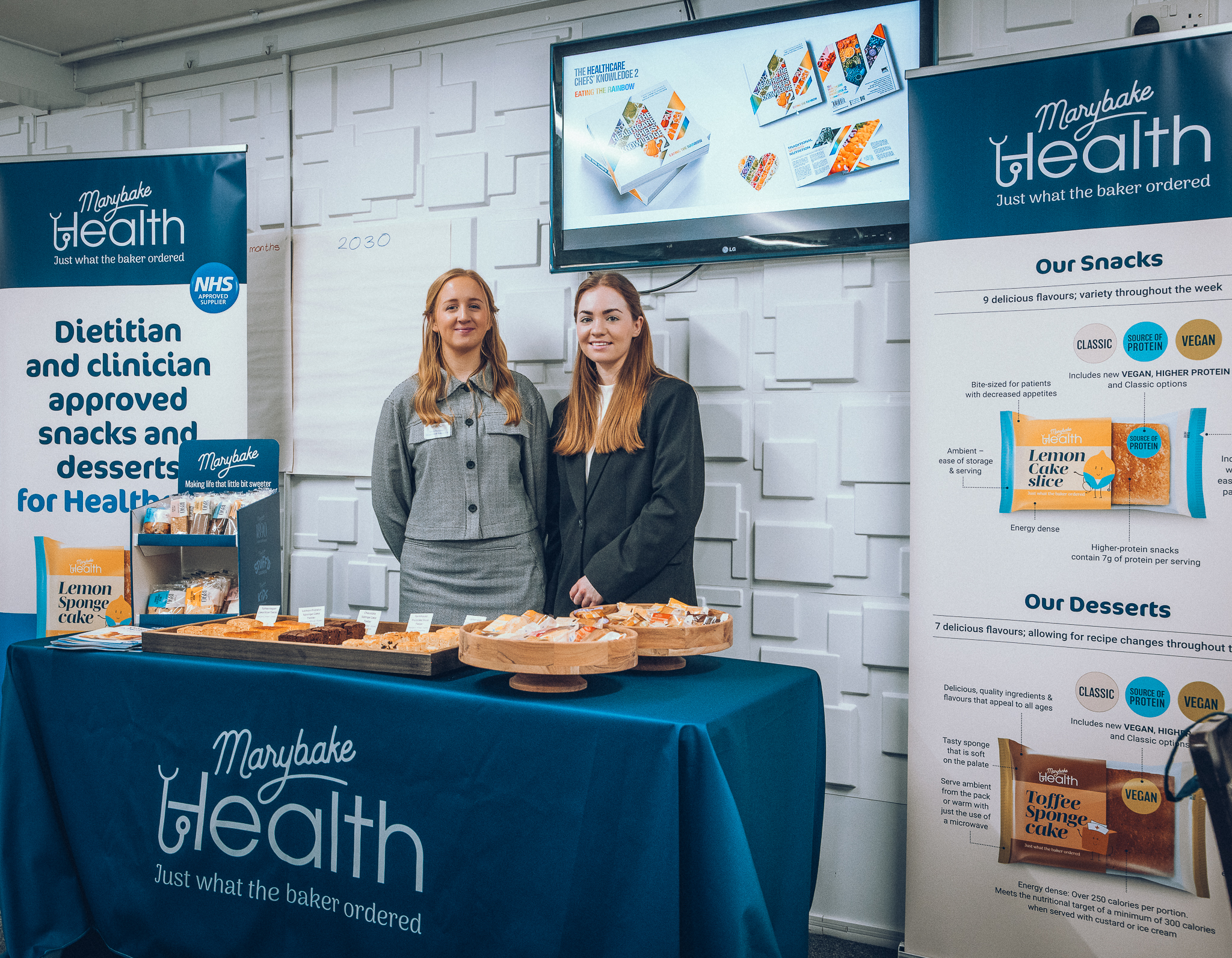 Brianna Matley from Supporting Sponsor Queensland Bakery introduced a new range of NHS dietician-approved, nutritionally dense cake and baked snacks designed to support patient nutrition through all-day snack availability, for patients who either miss meals or don’t have too much of an appetite. The range is available in three categories, classic, vegan and higher protein.
Brianna Matley from Supporting Sponsor Queensland Bakery introduced a new range of NHS dietician-approved, nutritionally dense cake and baked snacks designed to support patient nutrition through all-day snack availability, for patients who either miss meals or don’t have too much of an appetite. The range is available in three categories, classic, vegan and higher protein.
Brett Fowler, Sales Director, Queensland Bakery said
“At Queensland Bakery we’re delighted to be supporting The Healthcare Chefs’ Knowledge 2 – Eating the Rainbow. With our NHS dietitian-approved Marybake Health range, our aim is simple: to meet the needs of NHS patients with tasty, patient-focused snacks and desserts. We offer higher protein, vegan and classic options to improve patient nutrition whilst providing much needed moments of pleasure. Great taste, nutrient dense, individually wrapped portions means less waste; just one of our environmental goals with Marybake Health.”
Nick Vadis, Culinary Lead for NHS Supply chain, played a big part in the practical element of the day, cooking the sustainable carbon-friendly lunch with the students from Bournemouth and Poole College and leading the activity on recipe reformulation ideas, he concluded
“Teaching the delegates about ways in which recipe reformulation with the aid of tools like one of our much-valued Headline Sponsors, Saffron by CIVICA can be used to reduce carbon totals in recipe redesign processes and their reformulation. Recipe development, fresh ingredients, and reducing food waste are all very important to us here at NHS England and today’s session reinforced to all of us, that food must remain central to patient recovery and overall 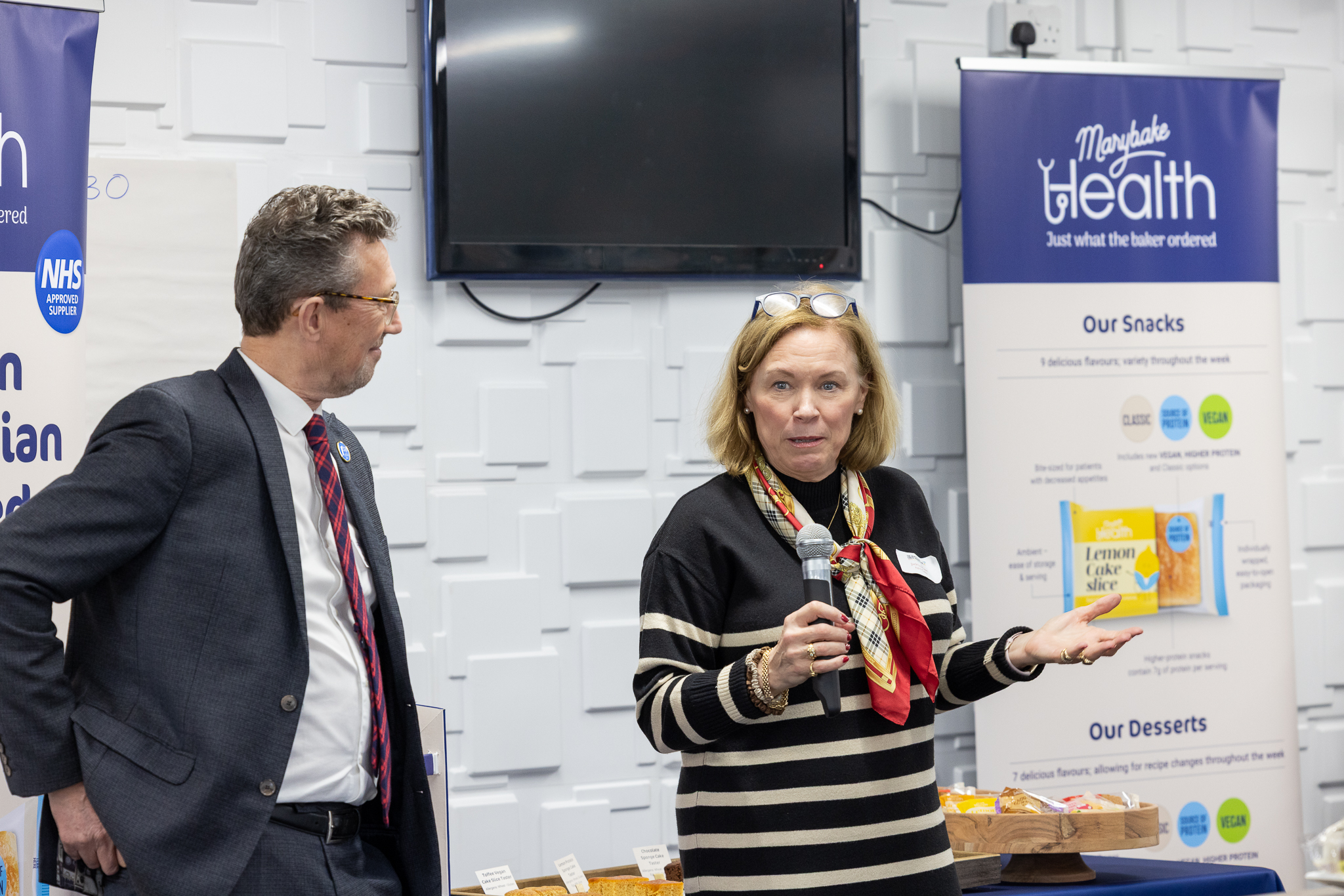 well-being. Our chefs must take into account seasonality and buying with the seasons and using produce at its best. In following proven and tested recipes, we will achieve a consistency of offer, that will enable us to effectively manage food waste and prevent over production. Continuous training and development are the key components to empowering our NHS Chef teams to be the best they can be each and every day for the benefit of patients , staff and visitors.”
well-being. Our chefs must take into account seasonality and buying with the seasons and using produce at its best. In following proven and tested recipes, we will achieve a consistency of offer, that will enable us to effectively manage food waste and prevent over production. Continuous training and development are the key components to empowering our NHS Chef teams to be the best they can be each and every day for the benefit of patients , staff and visitors.”
Jacklyn Case, Marketing Director from Headline Sponsor, NH Case highlighted the need for flexibility and innovation in NHS supply chains and championed the inclusion of SMEs to facilitate diverse, agile solutions. A delicious Hoki curry was served for lunch, which is a sustainable fish species supplied to hospitals the country.
Jacklyn said
“This has been another great session today, and it has been fascinating to hear about all the ways in which NHS England is striving to reduce its carbon footprint and enhance sustainability. NH Case has been supplying the NHS for nearly 60 years with a diverse range of sustainable fish species and low-carbon ready meals. It is our pleasure to support this new publication, enabling us to communicate how we can assist NHS healthcare caterers in producing sustainable and delicious meals for patients, staff and visitors.”
As the NHS continues its journey toward net zero by 2030, the discussions and outcomes from this workshop series will directly inform the strategic direction of foodservice operations across the sector—ensuring that sustainability, seasonality, and quality remain core pillars of the future NHS menu.
Film & photography by Carlos Farinha @carlosclickuk
Thank You for an Excellent Show, that Gets Better Every Year!
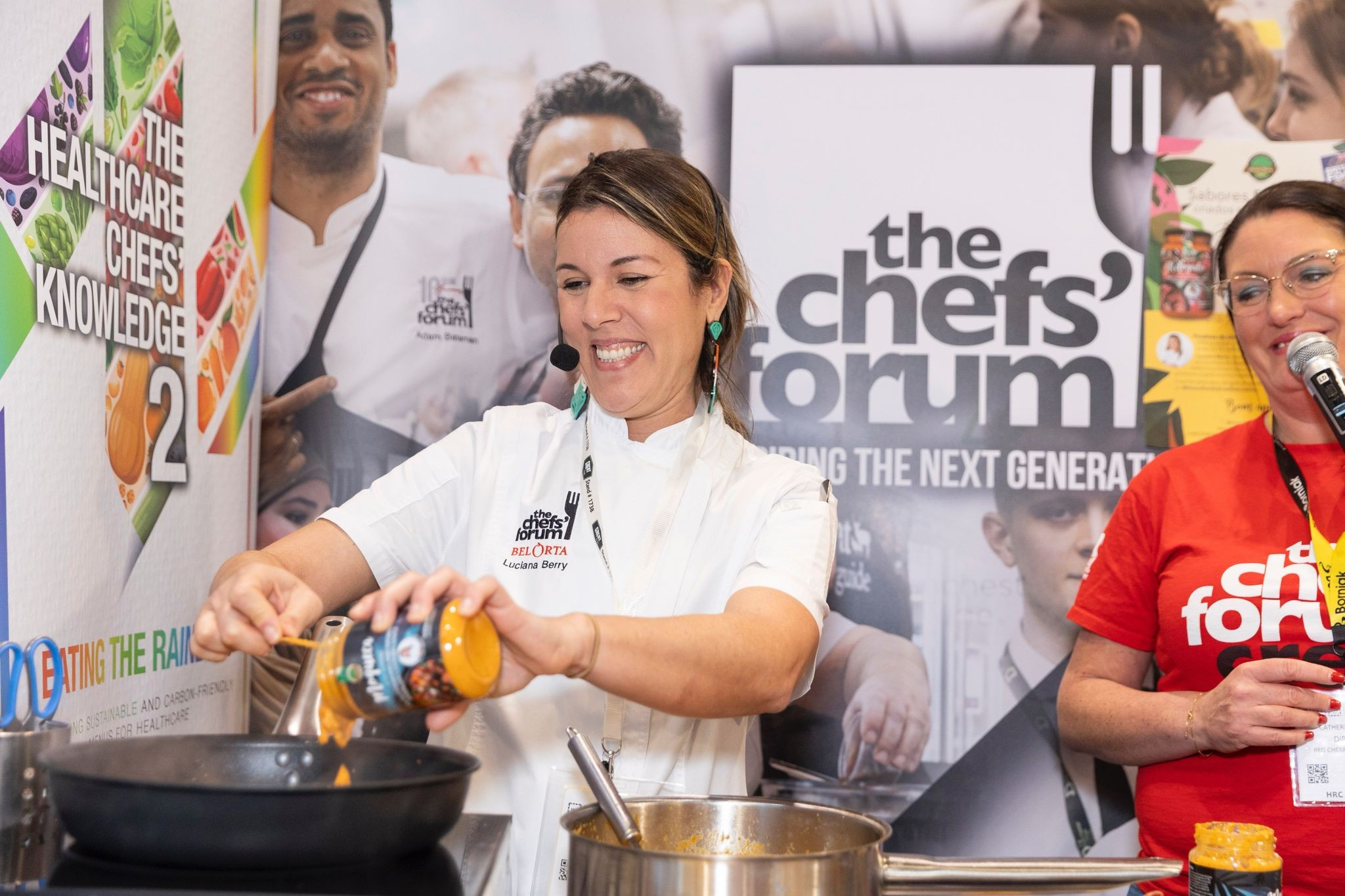 This time last week at HRC 2025 at ExCeL London, The Chefs’ Forum Demo Stage was a true highlight of the show, drawing crowds of foodie visitors, culinary professionals, and suppliers, all eager to witness top-tier chef talent in action.
This time last week at HRC 2025 at ExCeL London, The Chefs’ Forum Demo Stage was a true highlight of the show, drawing crowds of foodie visitors, culinary professionals, and suppliers, all eager to witness top-tier chef talent in action.
From international TV stars to esteemed college lecturers and executive hotel chefs, the line-up brought culinary excellence to life on stage. Among the standout names were Top Chef Brasil winner Luciana Berry (showcasing her wonderful range of Authentic Brazilian sauces), Stephen McClarty, of the BBC 2 show ‘The Chef’s Apprentice’, now with his own thriving restaurant, Sharkbait & Swim, nestled under the arches of Deptford Market Yard, London.
Luciana said
 “I really enjoy the HRC every year, working with a variety of brands and also to have showcased my own award-winning Brazilian cooking sauce range, aimed at the retail market, was just amazing – I was really happy to incorporate beautiful Royal Greenland cold water lobster, snow cod and prawns in my Moqueca recipe, then we garnished with beautiful, huge and juicy ocean caught Tiger Prawns, courtesy of Saqua Seafood, the best bit for me is moving between the HRC and co-located IFE to hunt and gather the finest fresh produce – Huge congratulations all on an excellent show!”
“I really enjoy the HRC every year, working with a variety of brands and also to have showcased my own award-winning Brazilian cooking sauce range, aimed at the retail market, was just amazing – I was really happy to incorporate beautiful Royal Greenland cold water lobster, snow cod and prawns in my Moqueca recipe, then we garnished with beautiful, huge and juicy ocean caught Tiger Prawns, courtesy of Saqua Seafood, the best bit for me is moving between the HRC and co-located IFE to hunt and gather the finest fresh produce – Huge congratulations all on an excellent show!”
Luciana’s sauce range also features two more sauces, targeted at the home cook, available in top retail outlets called ‘Pimento’ a Brazilian sauce and ‘Refogado’ a typical Brazilian base sauce for most tomato-based dishes.
 Stephen added
Stephen added
“Cooking with beautiful Aussie Lamb neck was so enjoyable, I pride myself on bringing back traditional, cheaper cuts, which are so flavoursome as we all know the fat makes for the dish’s flavour. My tagine inspired dish of Aussie lamb neck in a Moroccan Tagine style was a real hit with the punters and it was so much fun to be on stage with Catherine Farinha from The Chefs’ Forum, who compered my demo and supported in communicating the flavour profiles, pairings and cooking process to the audience. Thanks also to Richard Saunders, UK/EU Country Manager for Meat and Livestock Australia for coming along to tell the audience all about the provinandce and sustainability of this wonderful product – I can’t wait for next year’s show!”
Also impressing the crowds was Martyn Watkins of Laksa Shack, who also had his impressive range of handmade Richkins Woodcraft chopping boards, canapé boards and everything you can think of made of wood to enhance and culinary or BBQ experience.
National Chef of The Year, Kuba Winkowski also prepared a range of delicious canapés, showcasing the capabilities of the Borniak smoker.
Chef Fernanda Gama made beautiful eclairs in the Unox Bakerlux oven and showcasing the diverse functions of everything pastry from the Robo Cream machine.
Salvatore Maggio, Bar Manager at the 5-star Franklin Hotel wowed us with his cocktail flairing skills to create some sensational cocktails.
The Chefs’ Forum stand showcased an exciting range of flavours from the UK and beyond, supported by cutting-edge kitchen tech from Unox, CookTek and MCS Technical Products, Pastry Gelato Equipment and premium ingredients, giving the chefs the perfect tools to create culinary magic.
But it wasn’t just about the food. The Chefs’ Forum also took the opportunity to promote their brand-new book, The Healthcare Chefs’ Knowledge 2: Eating The Rainbow, produced in partnership with NHS England. This beautifully designed publication is being created in-house by The Chefs’ Forum’s publishing arm, artworked by our wonderful Head of Production and Design, Lee Yarlett and edited by Chandos Elletson. Any suppliers to NHS England are welcome to get involved and showcase what they are doing to help healthcare chefs, catering managers and stakeholders meet net-zero targets and enhance sustainable menus in healthcare kitchens.
The Chefs’ Forum Demo Stage once again proved to be a must-visit destination at HRC – A celebration of skill, innovation and collaboration in the world of professional cookery.
For more information on The Healthcare Chefs’ Knowledge 2: Eating The Rainbow, contact catherine@redcherry.uk.com
Ritter Courivaud Hosts an Inspired Afternoon of Pastry and Premium Ingredients
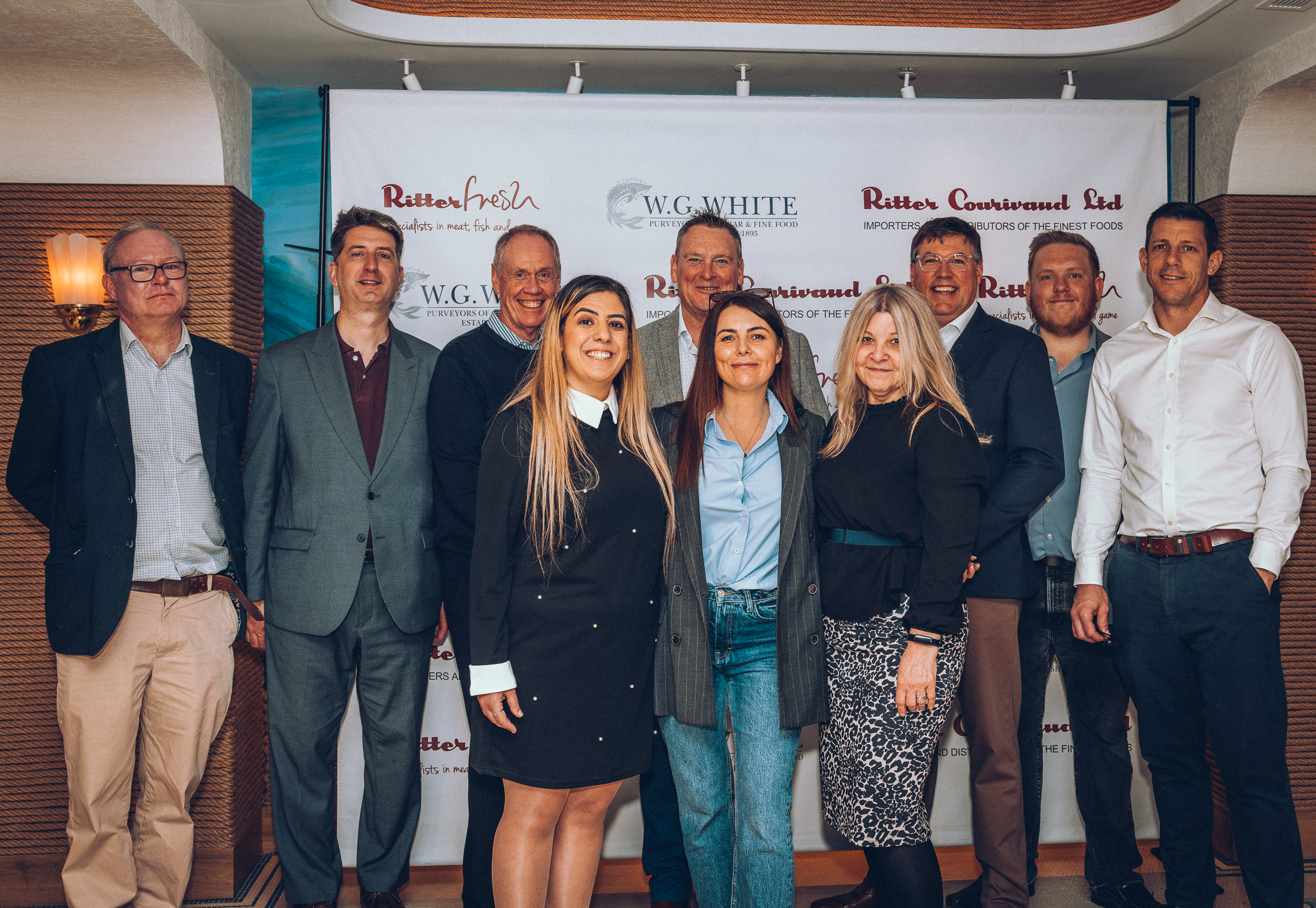 On Thursday, 20th March 2025, Ritter Courivaud, a leading name in National fine food and ingredient distribution, welcomed culinary professionals and pastry enthusiasts to an exclusive afternoon of pastry inspiration and innovation held at the beautiful Manzi’s of Soho in London. The event, held in celebration of the Ritter’s exceptional portfolio, showcased some of the world’s finest pastry ingredients through engaging demonstrations and tastings from globally renowned suppliers to the pastry sector.
On Thursday, 20th March 2025, Ritter Courivaud, a leading name in National fine food and ingredient distribution, welcomed culinary professionals and pastry enthusiasts to an exclusive afternoon of pastry inspiration and innovation held at the beautiful Manzi’s of Soho in London. The event, held in celebration of the Ritter’s exceptional portfolio, showcased some of the world’s finest pastry ingredients through engaging demonstrations and tastings from globally renowned suppliers to the pastry sector.
Lauren Parker, Sales Director at Ritter Courivaud and Ritter Fresh, welcomed the specialist chefs to the event; she said
“Our rich heritage and ethos to supply the finest ingredients to the finest establishments live in the DNA of Ritter Courivaud, and our supply partnerships are held in the highest of regards. We are very proud to be able to collaborate with six of our key partners today – displaying product innovation in a way that is not always possible from a meeting room. I’m truly humbled by the customers who have taken time out of their day to join us this afternoon, and I would like to thank everyone for both their attendance and support.”
Some of the UK’s finest pastry chefs, high-end bakers, and cakery owners were treated to a sensory journey beginning with an interactive chocolate flavour pairing and educational session led by Julie Sharp and Mark Tilling, showcasing Callebaut’s rich legacy and evolution. The duo explored the cacao bean’s journey, communicated the complexities of the volatile chocolate market, and examined price fluctuations over the years — all while guests sampled expertly paired chocolates and perfect flavour combinations.
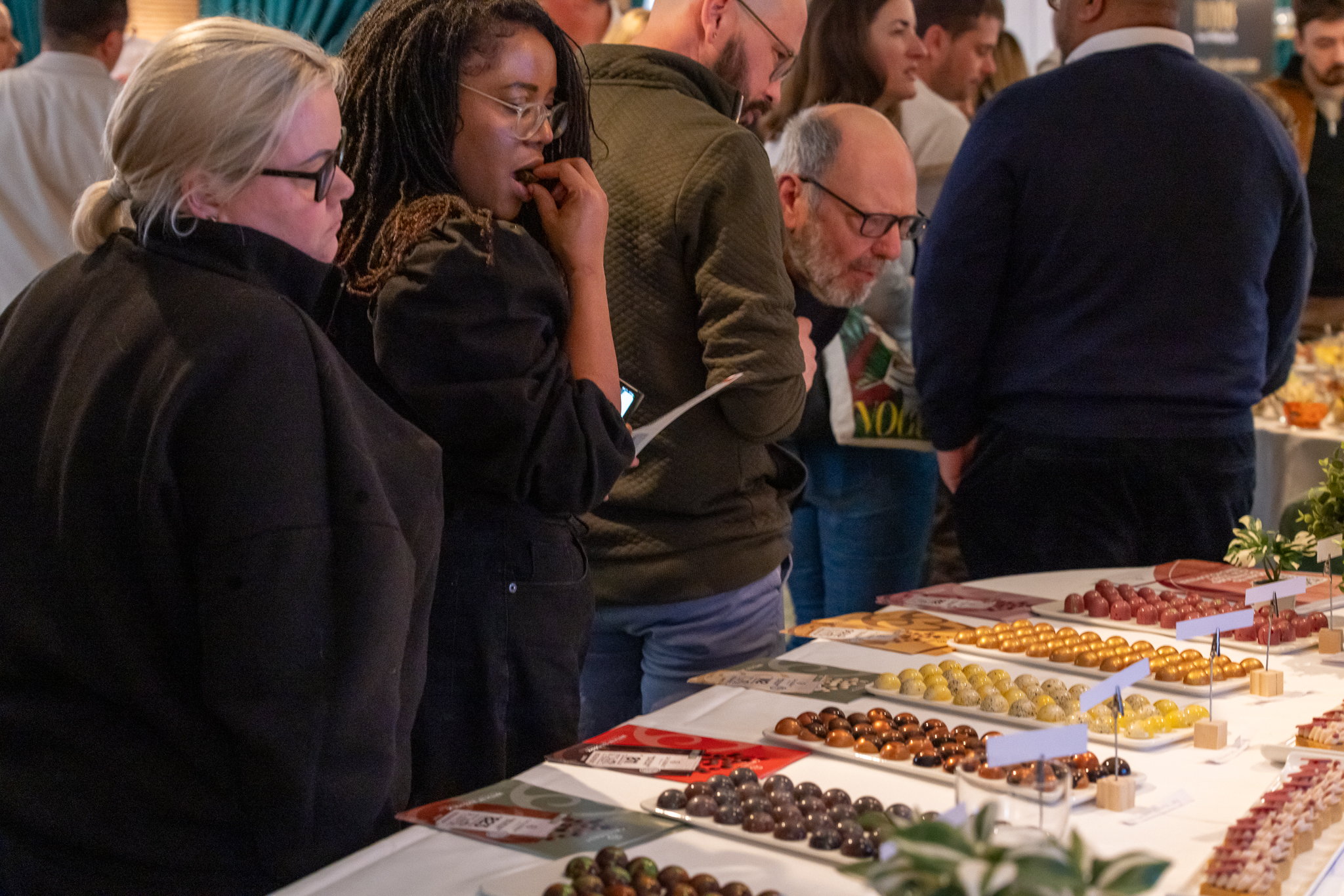 Tammy Lee, National Account Manager at Barry Callebaut, Gourmet UK said
Tammy Lee, National Account Manager at Barry Callebaut, Gourmet UK said
“Today’s pastry innovation event was an excellent opportunity to tell the story behind our wonderful range of chocolates and talk about our 100% sustainable cocoa beans and certified organic chocolates, chips, chunks, fillings, nuts, and cocoa powders. Using our flavour pairing kit, developed with sommelier François Chartier, chefs can use our flavour cards to help them with inspiration for their menu creations. The cards suggest ingredients with molecular and aromatic similarities, offering chefs a palette of original combinations for their creations and this is what we have demonstrated in our interactive tasting session that we gave today.”
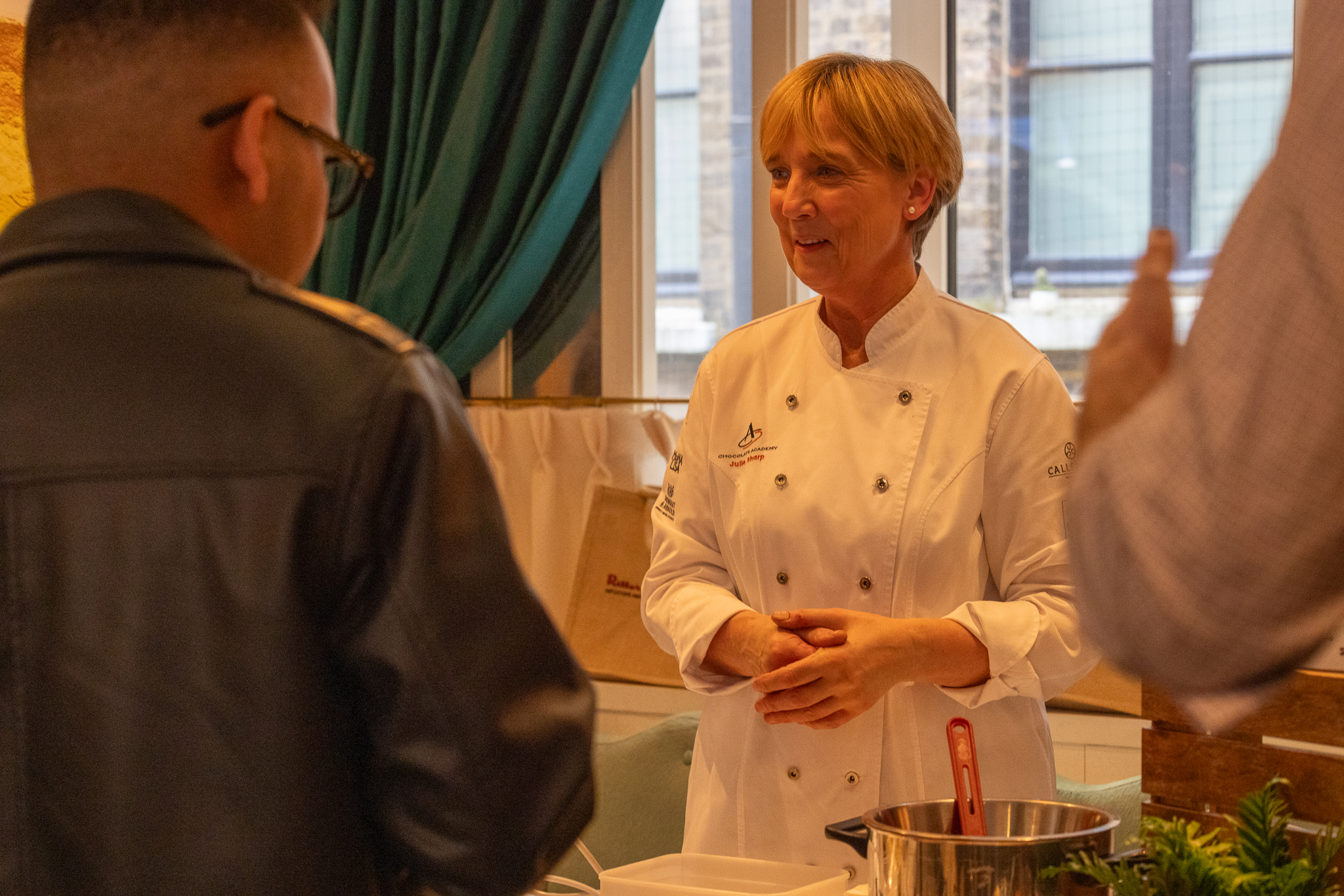 Julie Sharp, Head Chef of Barry Callebaut Chocolate Academy UK & Ireland added
Julie Sharp, Head Chef of Barry Callebaut Chocolate Academy UK & Ireland added
“The event was a great way to showcase how chefs can innovate their menus and excite their guests with daring combinations – We were pleased everybody was up for the challenge! Callebaut Ruby 2 chocolate, blue cheese, and tomato won the best taste combination, closely followed by Callebaut Gold chocolate, comté cheese, parsnip, and pecan.”
A highlight of the day was the presentation from Agrimontana, one of Ritter Courivaud’s longest-standing partner. The iconic Italian brand delighted guests with its exquisite panettone and provided an insightful overview of the intricate panettone-making process. Guests also sampled its exceptional candied chestnuts, candied citrus fruits, and pistachio paste, which continue to set the standard for artisanal ingredients and were a huge hit with the chefs who attended, many of whom were given a luxury panettone to take home with them!
 Spencer Jones, Head of Sales (Southern England), Ritter Courivaud said
Spencer Jones, Head of Sales (Southern England), Ritter Courivaud said
“My customers always tell me how much they love working with Agrimontana’s exceptional ingredients that help them make the perfect panettone. In particular, trust the product to really elevate their artisanal panettone to create something truly special. It was wonderful for Simone Gozzetti to meet our much-valued customers and showcase his fantastic range to them.”
Elle & Vire Professional brought French excellence to the table with their butters and whipping creams, offering a hands-on look at how different dairy textures and flavours perform in pastry applications. Attendees learned how to elevate recipes using the brand’s premium cream and butter range.
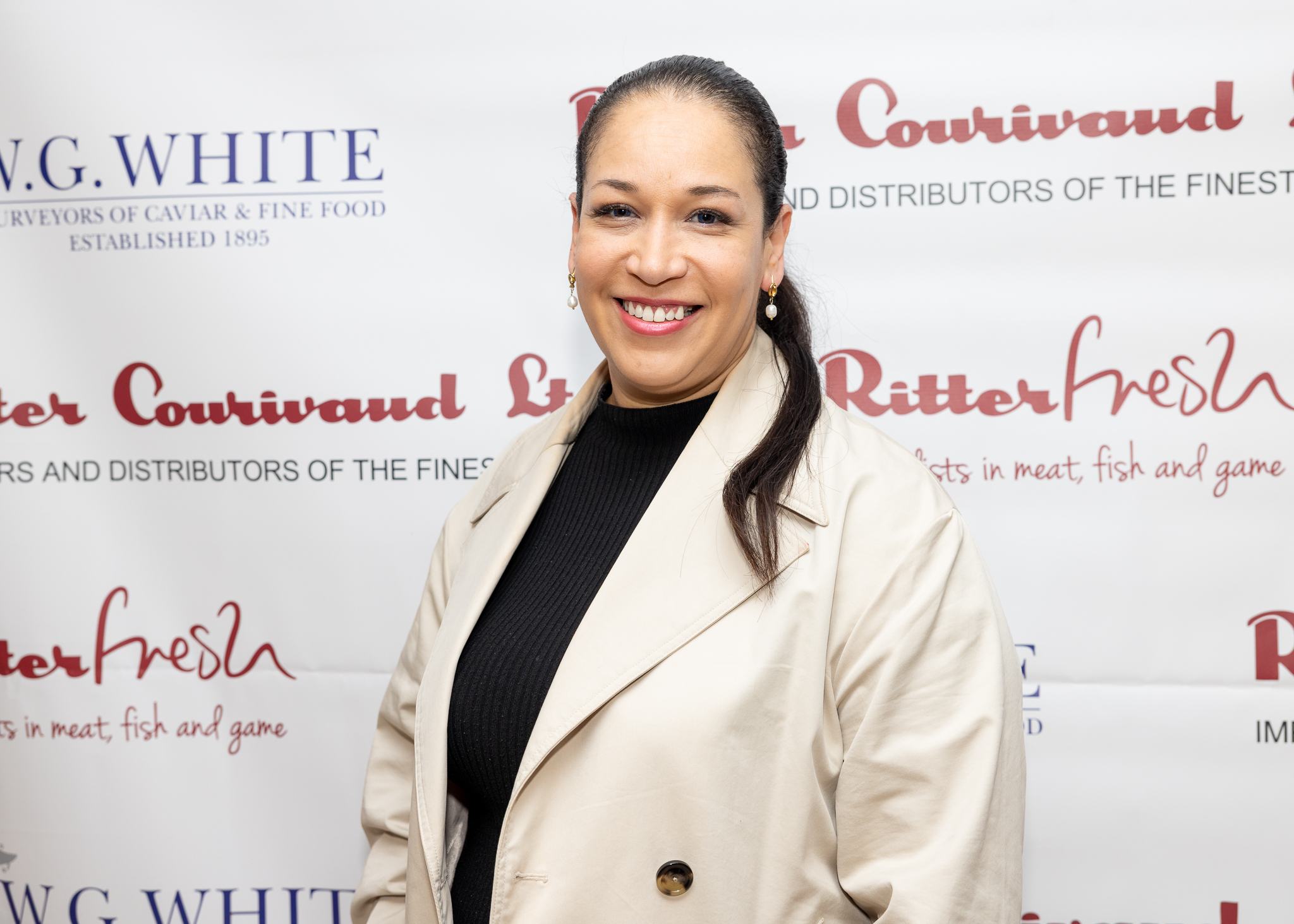 International Pastry Judge, Franciane Tartari swears by Elle & Vire products and won’t use anything else, she said
International Pastry Judge, Franciane Tartari swears by Elle & Vire products and won’t use anything else, she said
“I know with Elle & Vire that I am using the best product available on the market, the butter enables me to be confident in bringing out different flavours, making it an essential ingredient for all my dishes. I particularly like the Excellence Cream as it is quick to thicken with great hold and I use it in many different desserts and pastries, sometimes up to 40 litres per day – I am delighted to be here today, and it is always such a pleasure to catch-up with my wonderful Ritter Account Manager, Jean Ferragu, who always goes the extra mile to make sure I have everything I need, whenever I need it – Great service.”
Also featured was La Rose Noire, showcasing their beautifully hand-crafted tart shells. Founded by award-winning Swiss pastry chef Gerard Dubois, La Rose Noire tarts are a favourite among chefs seeking artisanal quality with consistent results.
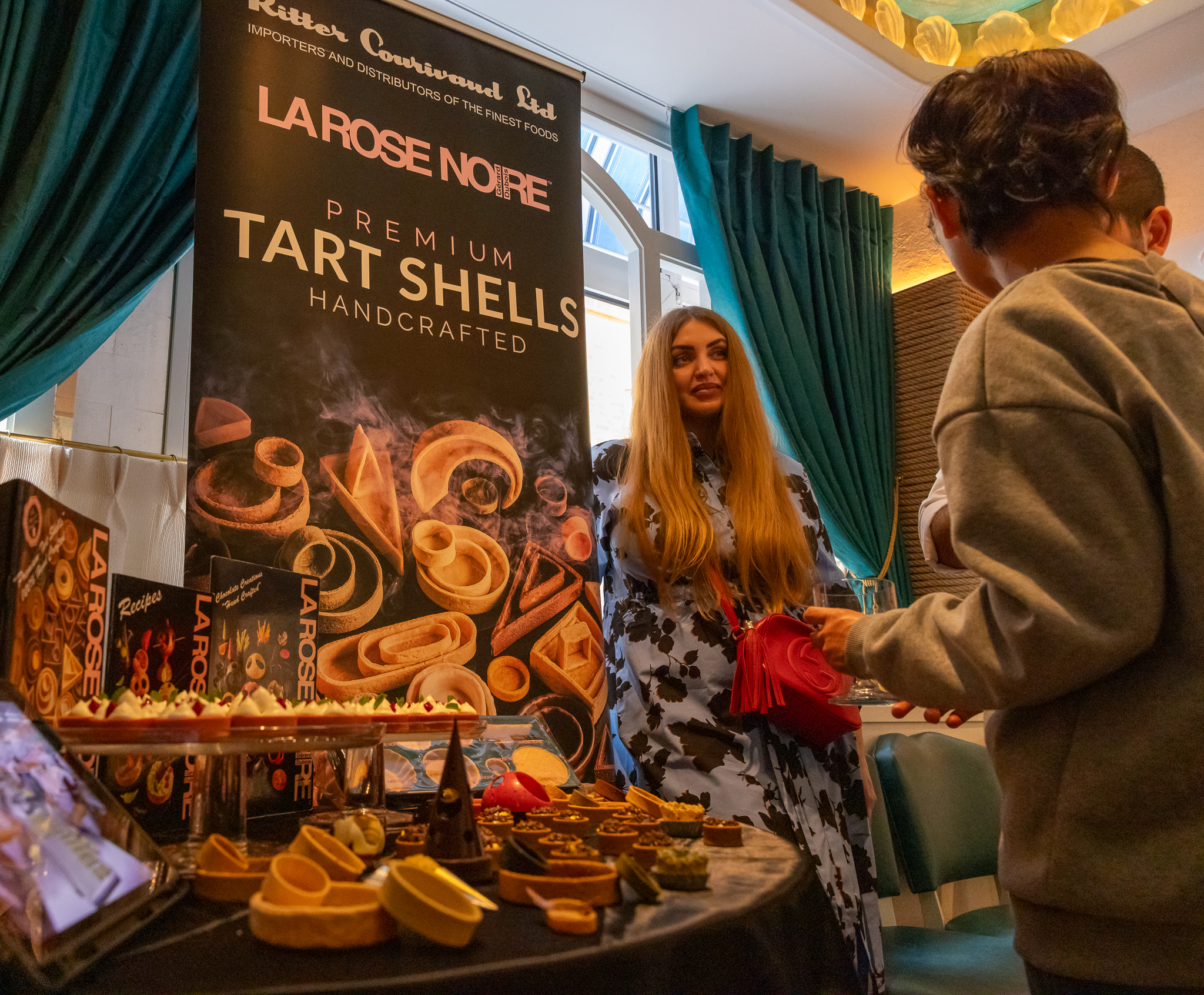 Rebecca Marshman Rondeau, Group Head Pastry Chef at BaxterStorey said
Rebecca Marshman Rondeau, Group Head Pastry Chef at BaxterStorey said
“It has been wonderful to catch-up with friends old and new today and enjoy an interesting day of inspirational talks from the suppliers who were showcased. I was delighted to meet Ana Andrade from La Rose Noir and see the range of tart shells available, great for large functions and reducing labour intensity in our pastry kitchens – The vegan range is of an exceptional standard and a real lifesaver when catering for plant-based dietary requirements, I am very grateful to Lauren and the team for inviting me.”
Adding a fruity flourish to the afternoon, Boiron captivated the audience with their extensive range of fruit purees. The recently launched fruit puree line for mixologists demonstrated the brand’s commitment to innovation, inspiring new recipe ideas for chefs looking to experiment with bold, natural flavours and now as ingredients on cocktail menus across the globe.
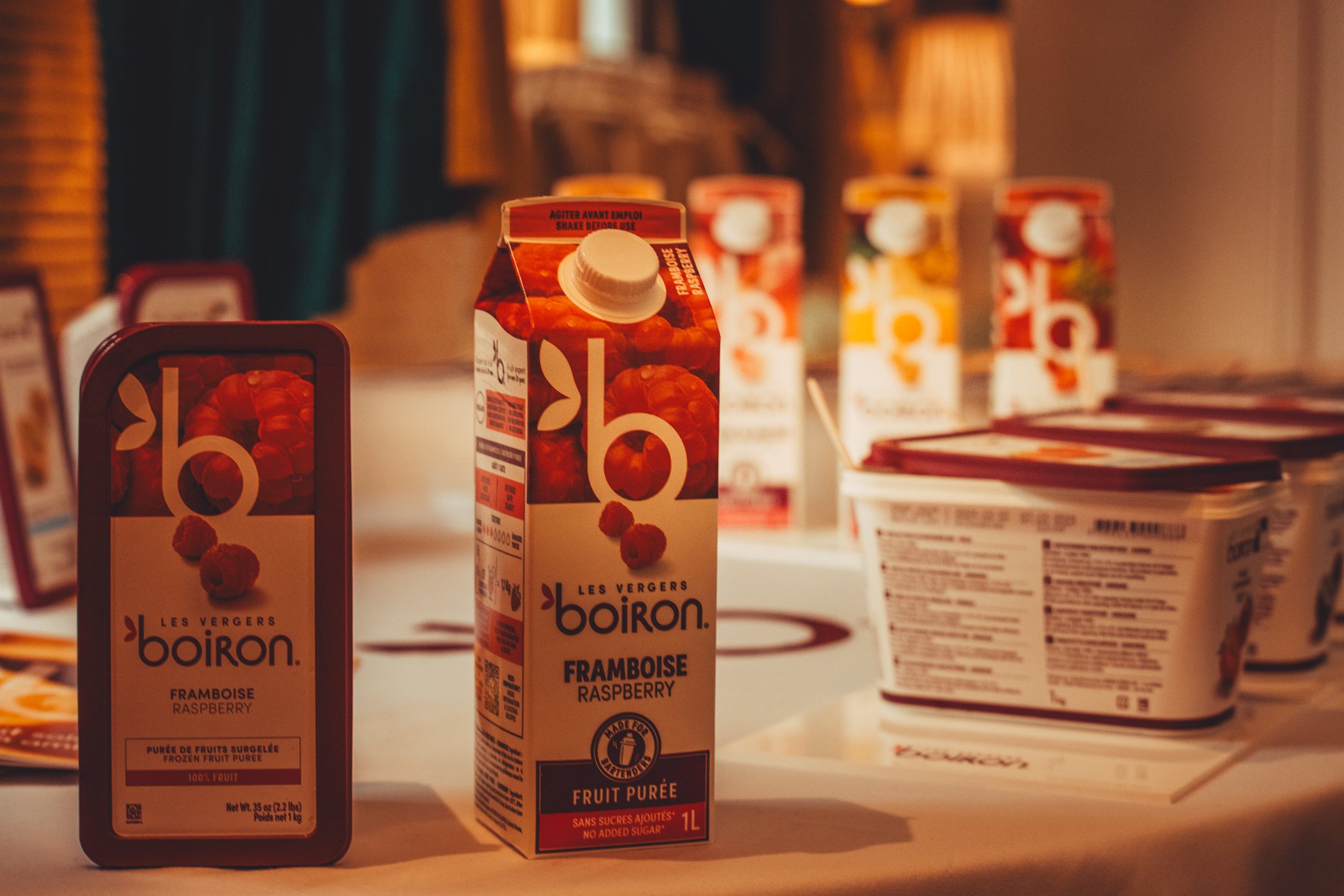 Zak El Rhzari, Key Account Manager at Boiron, UK & ROI said
Zak El Rhzari, Key Account Manager at Boiron, UK & ROI said
We are proud to have supplier Ritter for over two decades. As one of the market leaders globally for fruit purée, our mango, passion fruit, raspberry and strawberry purees have always been so popular among Ritter customers and now we have so many new citrus flavours like Sicilian lemon and kumquat, made with the whole fruit so you get the bitterness of the skin and a more balanced flavour. We are delighted to be here celebrating our longstanding relationship with Ritter, and it has been wonderful to catch up with all of the chefs who use our product range today.”
No afternoon would be complete without tea, and Novus Tea rounded off the event with a stunning selection of black, green, white, and herbal infusions. As a UK-based, family-owned business, Novus offered a refined tea-tasting experience that complemented the afternoon’s pastry creations perfectly.
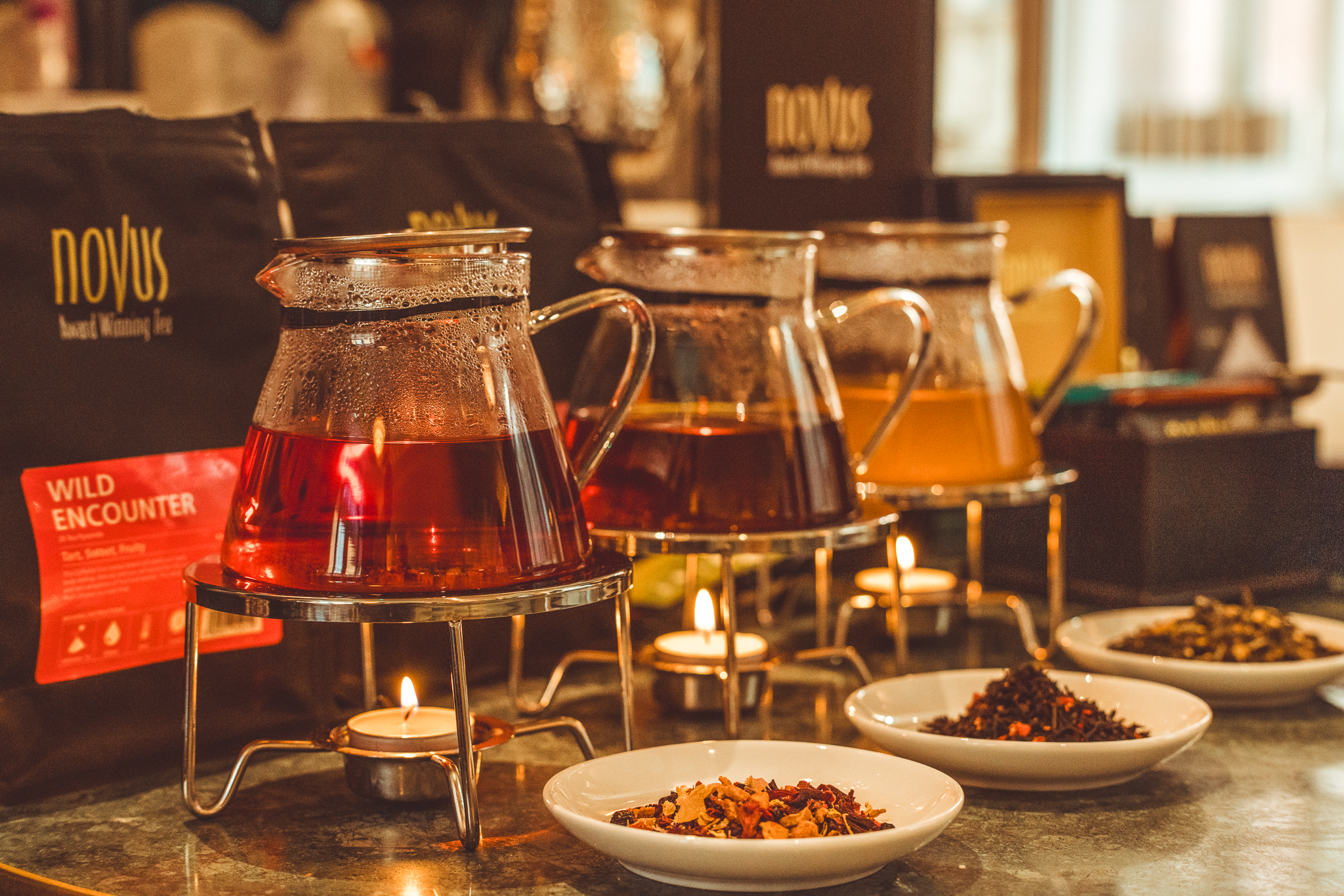 Sam Baker, Account Manager at Ritter Courivaud concluded
Sam Baker, Account Manager at Ritter Courivaud concluded
“I’ve invited many of my customers here today, many of whom have told me personally how much they enjoyed the event, which is great to hear. It was lovely to showcase our wonder suppliers and top-quality produce. It’s great to keep in contact with our customers and give them a wonderful day out at Manzi’s, where it was our turn to look after them as our guests and I would also like to thank the team at Manzi’s for the champagne and canapé reception and excellent hospitality.”
This immersive event reaffirmed Ritter Courivaud’s position as a trusted partner for premium ingredients and inspired the next wave of pastry creativity. The company continues to support chefs and culinary professionals by delivering the highest quality ingredients from leading global producers.
For more information on Ritter Courivaud and its wonderful product range, visit: www.rittercourivaud.co.uk
Photography by Carlos Farinha @carlosclickuk
Chef of the Week: Sarthak Puri, Head Chef at Butler’s Wharf Chop House in London
How long have you worked at your current restaurant?
I have been working with D&D London for the last 3 years.
Where did your passion for cooking come from and where did you learn your skills?
The creative aspect of cooking Is what I enjoy the most. Since food is a major topic in our family and everyone gets thrilled about the food on the table, I learnt how to cook with my mother at home. This inspired me to pursue a career in food.
What do you enjoy most about being a chef?
I get excited when I prepare food for other people and witness their joy.
Name three ingredients you couldn’t cook without.
Salt, garlic and oil.
Which piece of kitchen equipment couldn’t you live without?
My first chef knife which my father gifted to me.
What food trends are you spotting at the moment?
Consumer preference for locally sourced and sustainably produced food products is growing. This trend has impacted high-end restaurants, and to encourage sustainability, their dishes increasingly include more vegetables, vegan options and seasonal ingredients.
What do you think is a common mistake that lets chefs down?
Improper planning and communication with the team.
What is your favourite time of year for food, and why?
I enjoy cooking around festive times because we can serve a wide variety of meat and vegetarian options to our guests, which makes them happy.
Which of your dishes are you most proud of?
I think I’m proud of the crab and lobster risotto with saffron cappuccino that I made recently. My colleagues were amazed when I gave them a sample.
How do you come up with new dishes?
By taking inspiration from different cuisines and trying out new cooking methods. I think about seasonal produce and most importantly taste and improve until I achieve the desired flavour profile.
Who was your greatest influence?
My father who always used to make me try different flavours and new dishes from around the world.
Tell us three chefs you admire.
Vikas Khanna, Gary Mehigan and Vineet Bhatia.
What is your favourite cookbook?
Nose to Tail Eating by Fergus Henderson.
Who do you think are the chefs to watch over the next few months?
Ben Murphy and Vineet Bhatia.
What’s been your favourite new restaurant opening of the last year?
Vatavaran in London.
Chef of the Week: Timothy Dela Cruz, Head Chef at Smiths of Smithfield in London
How long have you worked at your current restaurant?
Been working at Smiths of Smithfield for about one and a half years.
Where did your passion for cooking come from and where did you learn your skills?
My passion from cooking was influenced by my mum and auntie, when I was a kid they used to run a “carinderia” hole in a wall eatery back in the Philippines.
What do you enjoy most about being a chef?
I believe as a chef we can help people to celebrate life and any achievements they achieved, and I love the human aspect of my career.
Name three ingredients you couldn’t cook without.
Salt, lemon and garlic.
Which piece of kitchen equipment couldn’t you live without?
Knife, as a chef you need to have a good and well looked after knife.
What food trends are you spotting at the moment?
Mainly laid back no fuss restaurants that offer a good variety of small plates.
What do you think is a common mistake that lets chefs down?
When they think they know everything, as a chef you should learn how to adopt, this career is a continuous learning process.
What is your favourite time of year for food, and why?
Autumn, I just love using game and foraged produce.
Which of your dishes are you most proud of?
I’m proud of my duck dish that has been smoked in hay, and I made a adobo sauce to go with it to pay homage to my Filipino heritage.
Who was your greatest influence?
It’s my dad, mum and wife as they sacrificed a lot to help me to be the person and the chef that I am today.
Tell us three chefs you admire.
Jason Atherton, Rene Redzepi, Jordi Navarro (Toyo Eatery in the Philippines)
What is your favourite cookbook?
The Noma Guide to Fermentation.
Who do you think are the chefs to watch over the next few months?
Florence Mae Maglanoc (Donia).
What’s been your favourite new restaurant opening of the last year?
Donia Soho (contemporary Filipino food).
NHS England Healthcare Chefs and Foodservice Stakeholders Talk Sustainable Futures in Birmingham
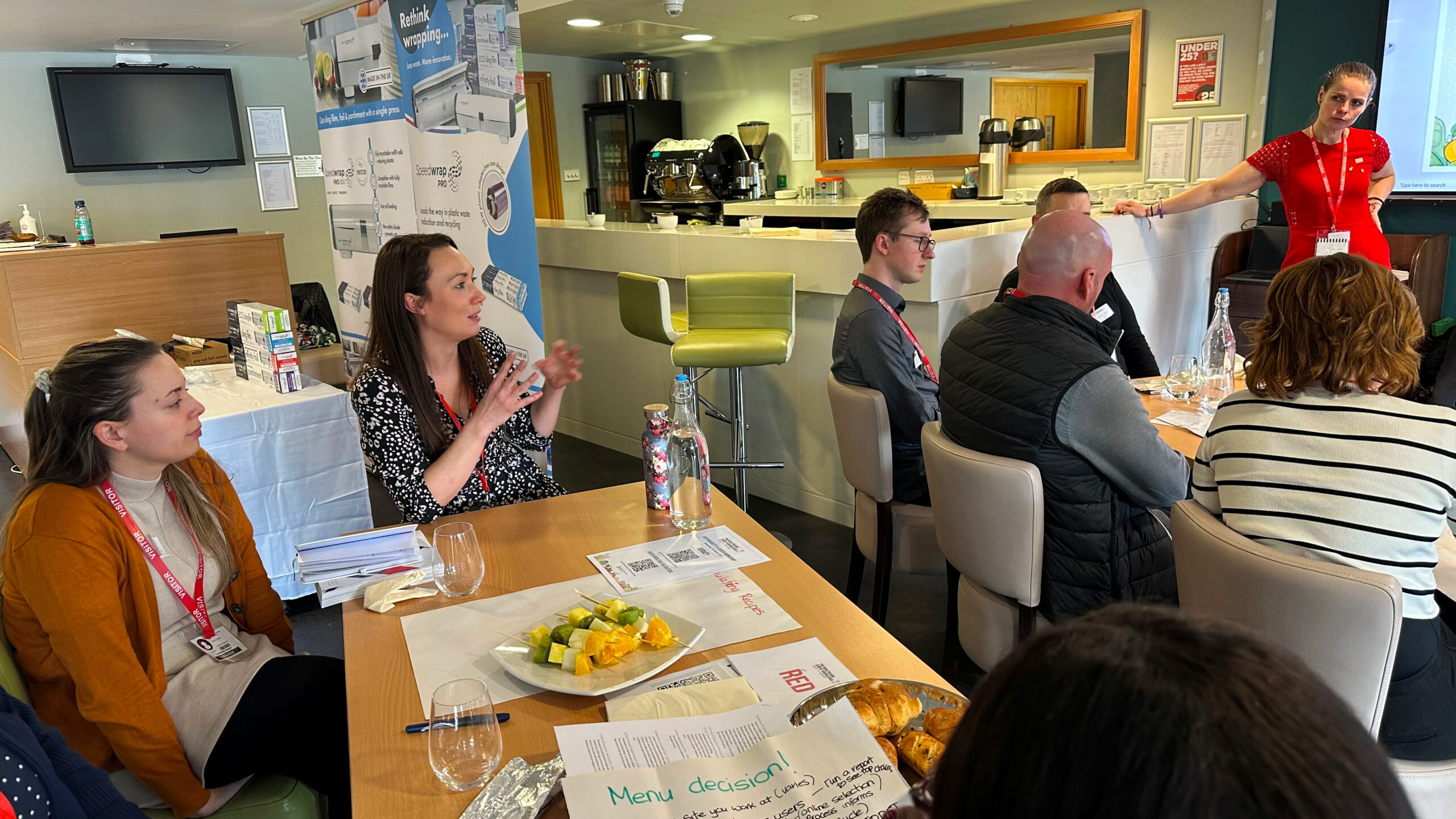 The latest “Eating The Rainbow” workshop took place on March 12th at South and City College Birmingham, bringing together NHS Chefs, Catering Managers, and Sustainability Leads. This vital session is part of a nationwide taskforce designed to generate a food waste reduction and sustainability strategy with food service stakeholders across the UK.
The latest “Eating The Rainbow” workshop took place on March 12th at South and City College Birmingham, bringing together NHS Chefs, Catering Managers, and Sustainability Leads. This vital session is part of a nationwide taskforce designed to generate a food waste reduction and sustainability strategy with food service stakeholders across the UK.
In partnership with NHS catering experts, The Chefs’ Forum continues its nationwide series of workshops aimed at shaping the second edition of The Healthcare Chefs’ Knowledge—a key resource tracking progress since the 2020 NHS Hospital Food Review. These interactive sessions provide healthcare chefs with a platform to collaborate, share best practices, and contribute to the ongoing evolution of hospital food service.
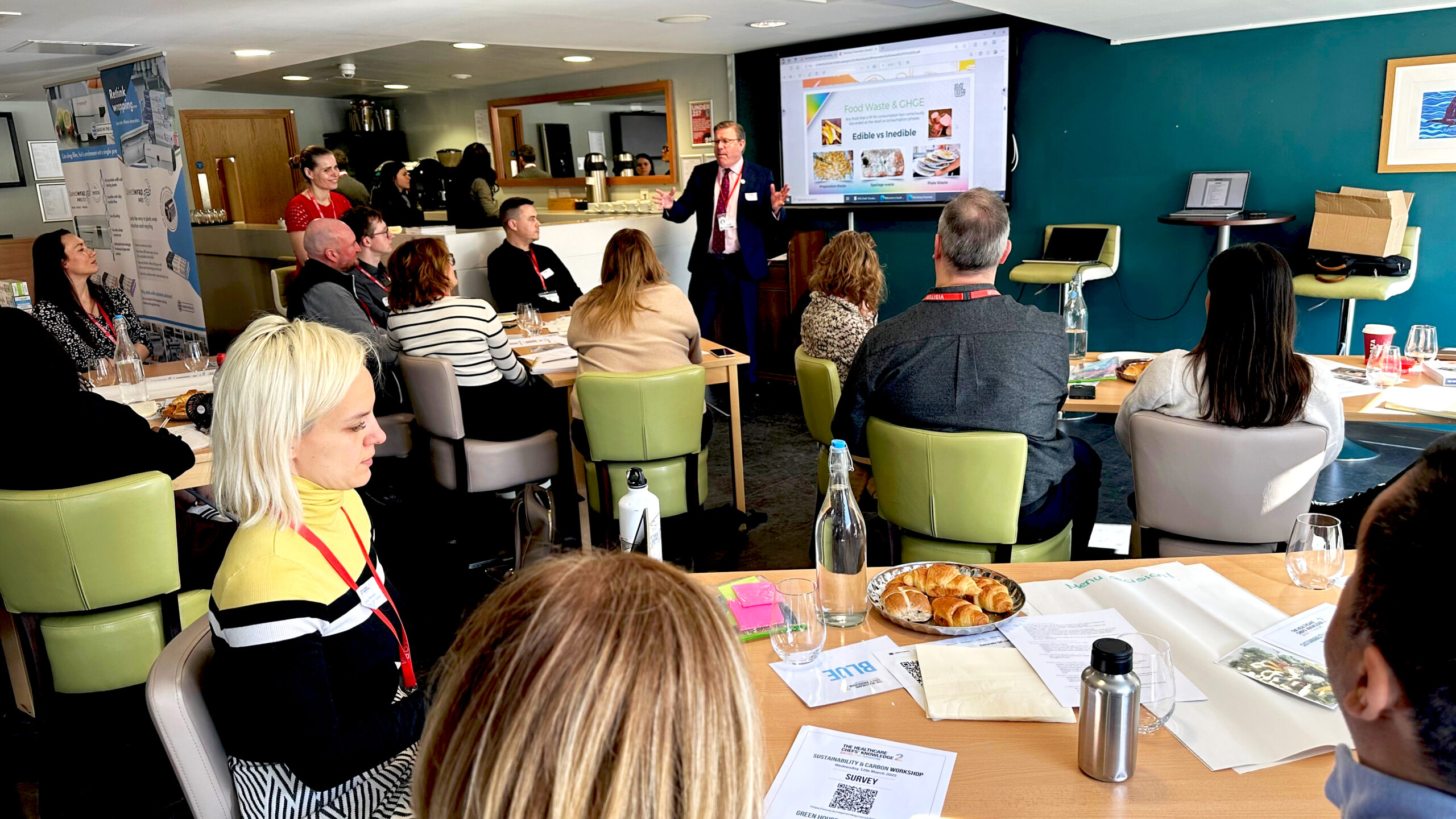 Tim Radcliffe, Net Zero Food Programme Manager at NHS England, emphasised the importance of this initiative:
Tim Radcliffe, Net Zero Food Programme Manager at NHS England, emphasised the importance of this initiative:
“The Healthcare Chefs’ Knowledge 2: Eating The Rainbow will provide critical insight into hospital food practices, focusing on sustainability and waste reduction. This edition will be an essential tool for chefs and caterers, equipping them with strategies to minimise food waste while delivering high-quality, nutritious meals. We are delighted to partner with The Chefs’ Forum to showcase the fantastic work being done and continue to drive forward positive change in healthcare catering.”
This edition will spotlight 100 carbon-conscious recipes designed to enhance sustainability and patient well-being. Additionally, it will explore practical waste management techniques that hospitals can implement to optimise resources and reduce their environmental footprint.
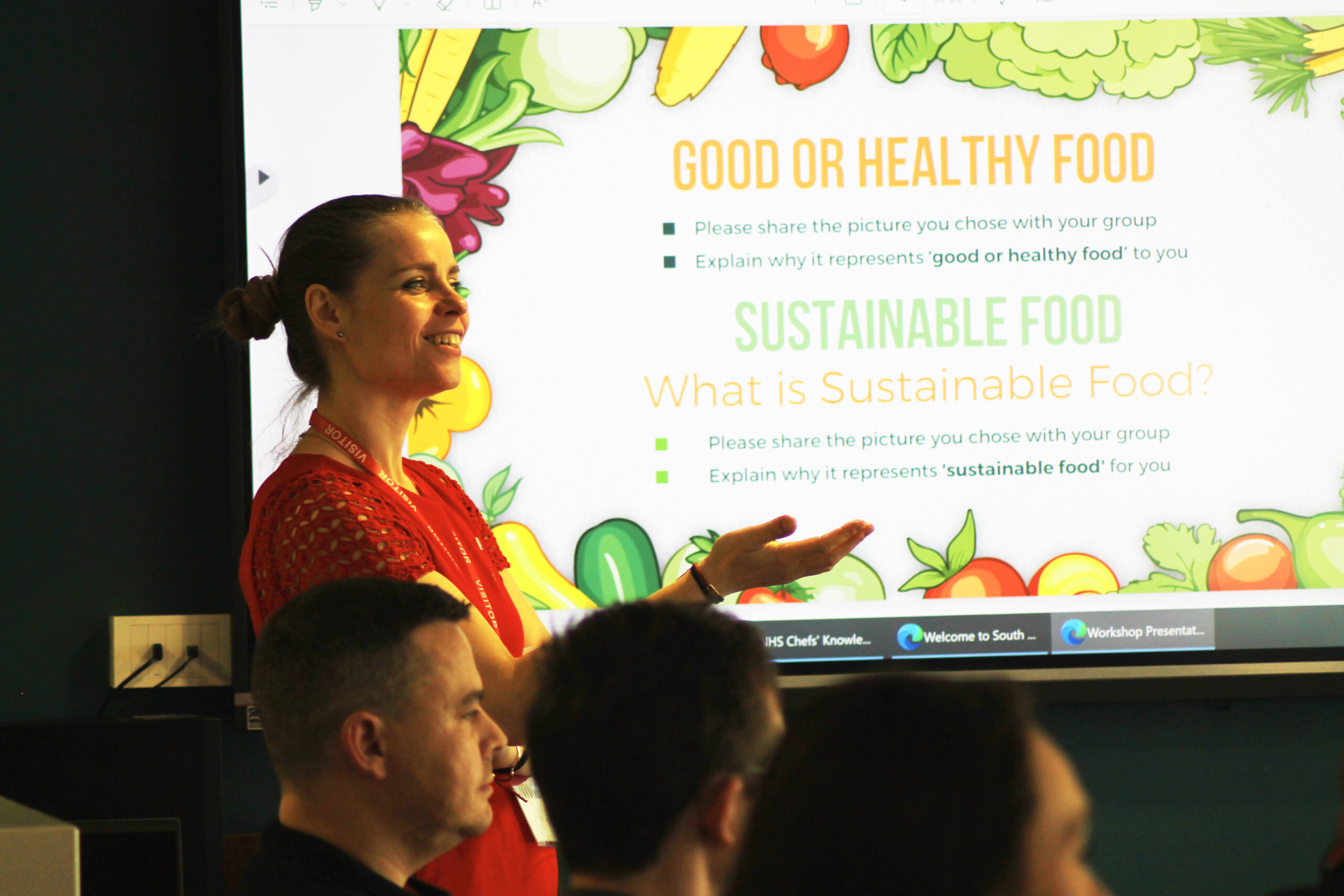 PHD Researcher at the UK Food Systems Centre For Doctoral Training, Andrea Zick, led the session with Tim and highlighted the significance of the discussions:
PHD Researcher at the UK Food Systems Centre For Doctoral Training, Andrea Zick, led the session with Tim and highlighted the significance of the discussions:
“I am honoured to have facilitated the fourth NHS England workshop in association with The Chefs’ Forum, deepening my understanding of the systemic change required in large organisations like the NHS. Achieving the ambitious goals of the NHS Hospital Food Review demands a systems-thinking approach—one that aligns with my experience in systems change facilitation through the School of Systems Change. This perspective reinforces the need for structured reflection and collaboration among stakeholders, ensuring that each menu cycle not only meets immediate demands but also drives long-term improvement in NHS food service.”
Philip Shelley, Senior Operational Manager and National Lead for Net Zero is delighted with the content and take-aways being yielded from this series of sustainability workshops, he said
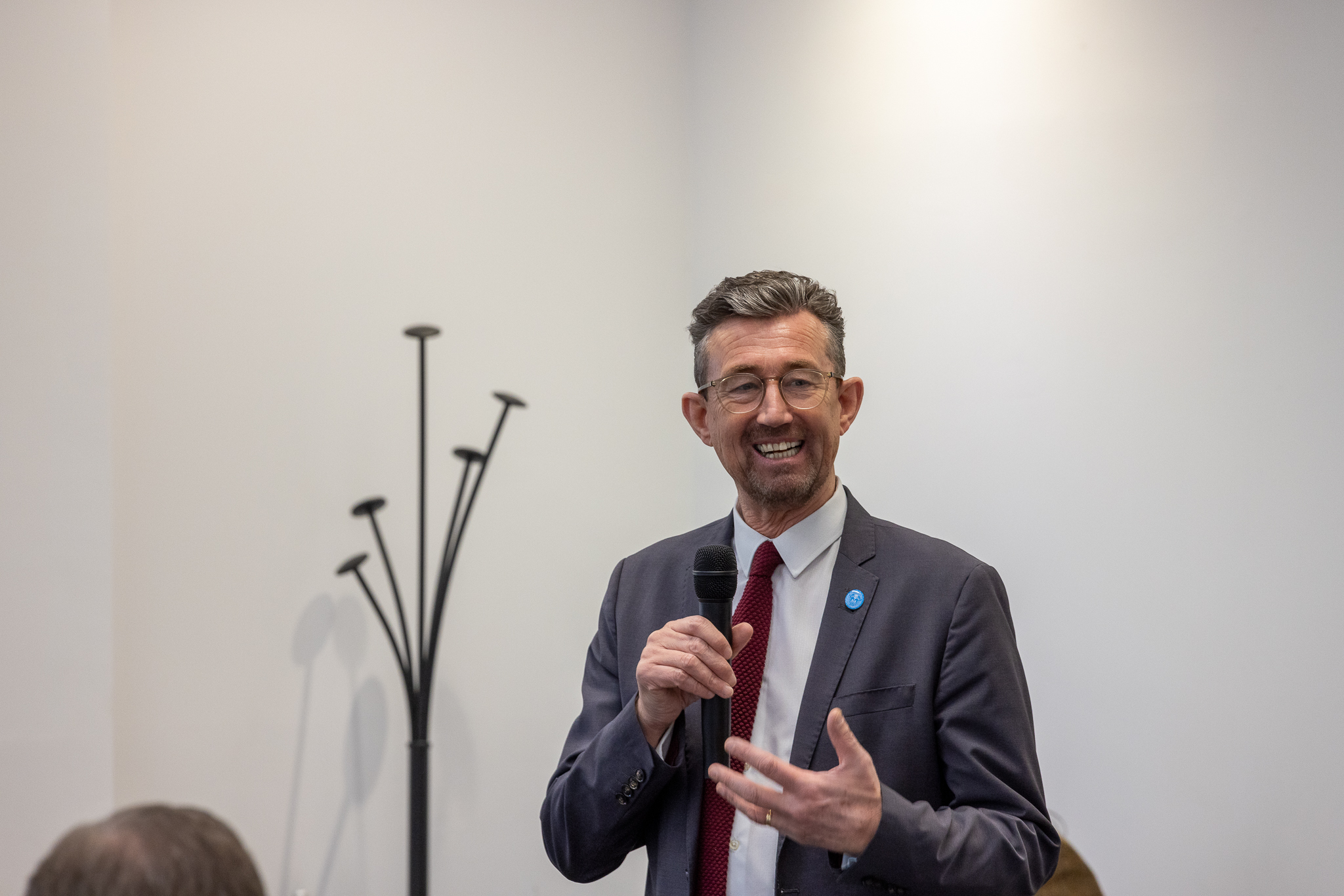 “These workshops allow us to bring together NHS chefs, suppliers, and sustainability experts to address key challenges such as food waste and cost efficiency. Food accounts for approximately 6% of our total carbon emissions in the NHS. It is estimated that the NHS disposes of approximately 14 million kilograms of unserved meals each year. Promoting healthier menus and minimising food waste will help cut costs and carbon while improving the health of patients, staff, and visitors. The conversations we have at these sessions are incredibly valuable, providing practical solutions that can be applied across hospital kitchens, food supply chains, and catering services.”
“These workshops allow us to bring together NHS chefs, suppliers, and sustainability experts to address key challenges such as food waste and cost efficiency. Food accounts for approximately 6% of our total carbon emissions in the NHS. It is estimated that the NHS disposes of approximately 14 million kilograms of unserved meals each year. Promoting healthier menus and minimising food waste will help cut costs and carbon while improving the health of patients, staff, and visitors. The conversations we have at these sessions are incredibly valuable, providing practical solutions that can be applied across hospital kitchens, food supply chains, and catering services.”
As one of five regional workshops led by The Chefs’ Forum, the Birmingham event underscored the NHS’s commitment to sustainability in healthcare catering. The workshop also provided a unique learning opportunity for culinary students at South and City College Birmingham, who collaborated with NHS chefs and assisted in preparing sustainable, waste-conscious meals for the delegates in attendance.
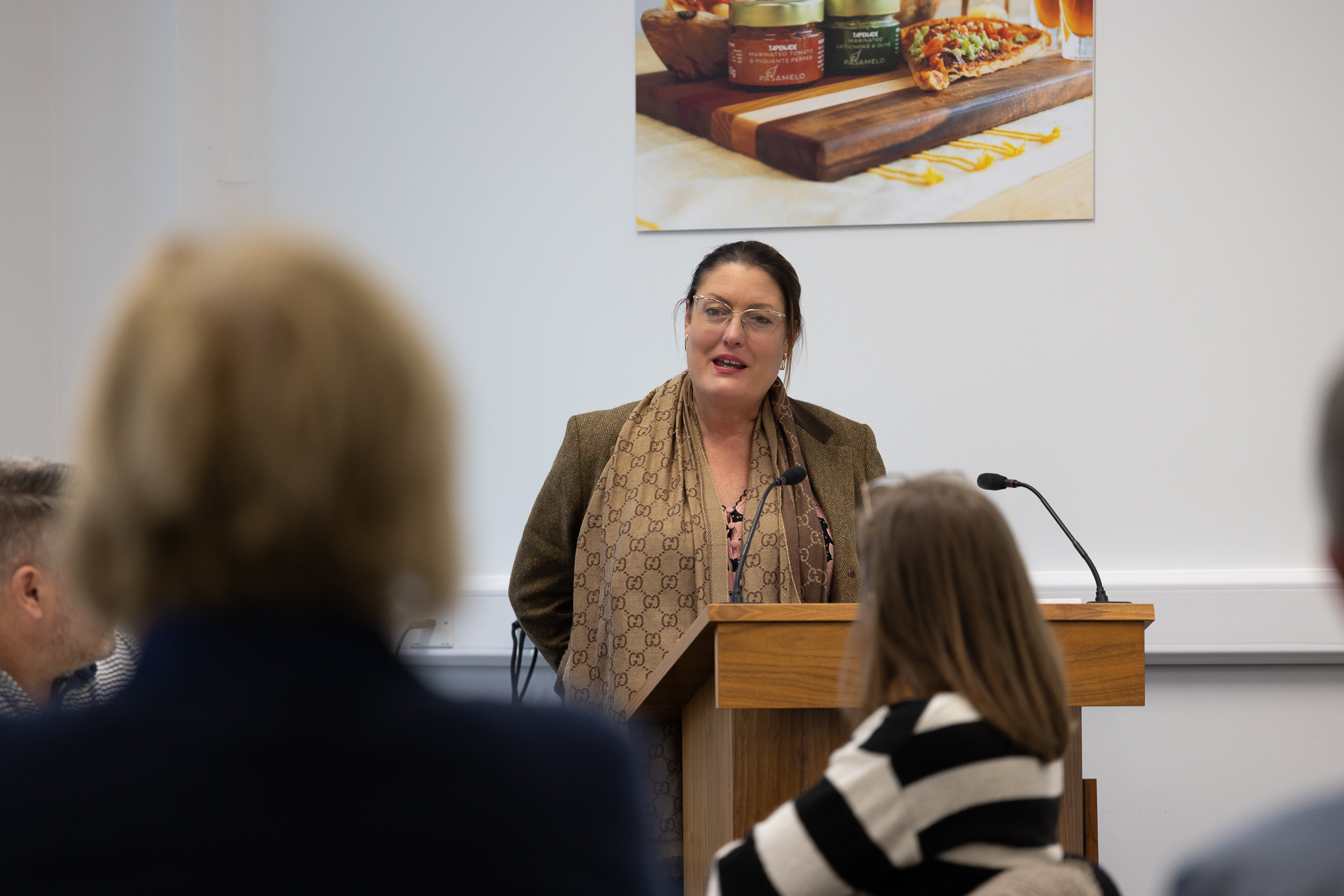 Catherine Farinha, The Healthcare Chefs’ Knowledge Publisher and Workshop Project Coordinator, reflected on the session’s impact:
Catherine Farinha, The Healthcare Chefs’ Knowledge Publisher and Workshop Project Coordinator, reflected on the session’s impact:
“This workshop was a fantastic opportunity to engage with NHS catering teams and witness first-hand their dedication to tackling food waste in healthcare. Seeing chefs and managers share their expertise and practical solutions is inspiring. This collaboration ensures that we reduce waste and create sustainable, cost-effective, and nutritionally balanced menus across the entire estate of 209 NHS Trusts.”
The workshop at South and City College Birmingham supported the NHS’s broader sustainability goals, empowering chefs, Facilities and Catering Managers to innovate and share best practices in healthcare catering. These workshops extend beyond recipe development—they drive systemic change to ensure that hospital food is both nourishing and environmentally responsible.
A highlight of the day will be a delicious ‘Eat The Rainbow’ lunch prepared by the students South and City College Birmingham Culinary Team, led by NHS Supply Chain Chefs Andy Chan and Mike Sharp, featuring a variety of vibrant and sustainable dishes that demonstrate how eco-conscious practices can be seamlessly integrated into hospital menus.
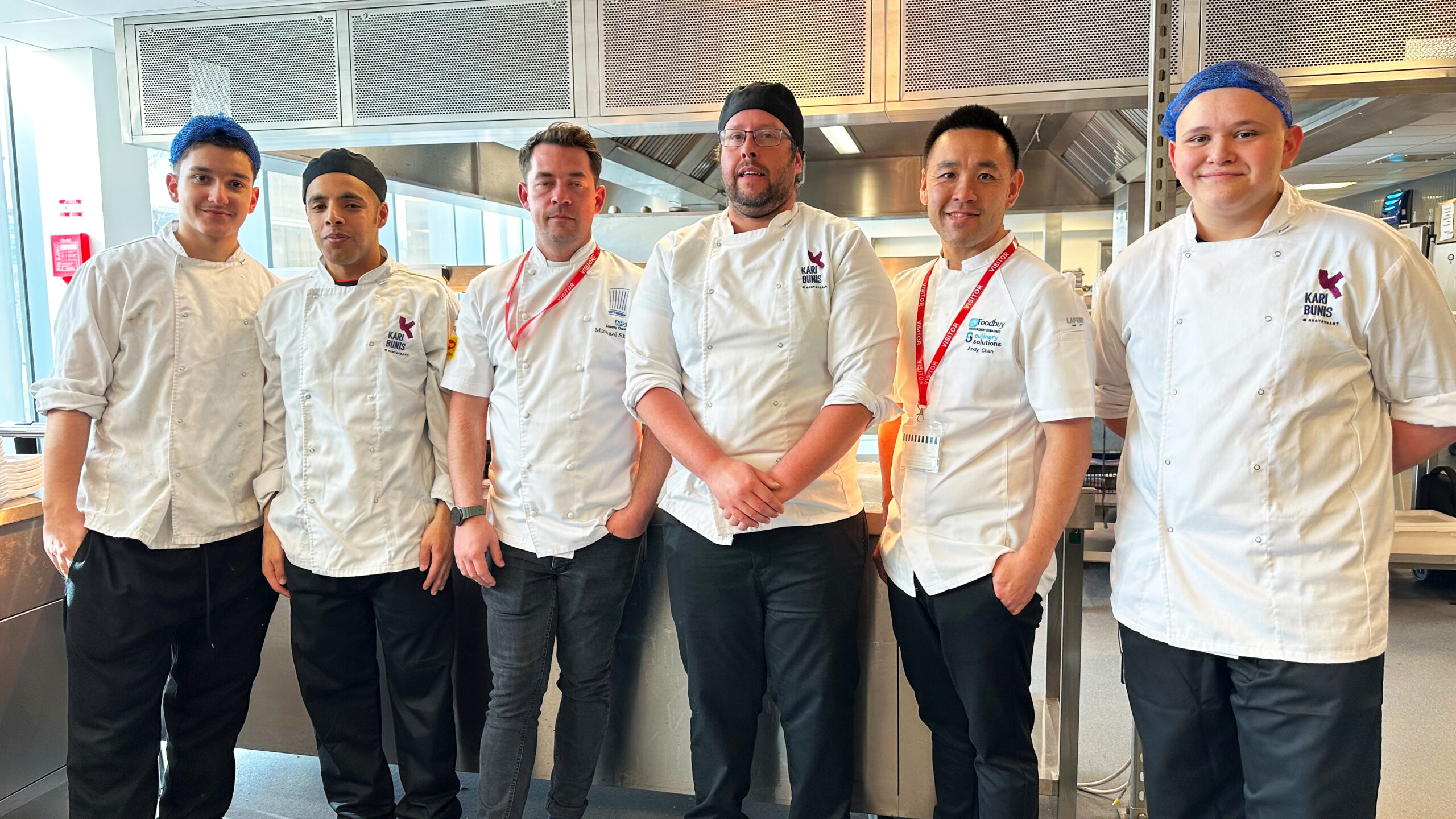 Andy Chan said
Andy Chan said
“I have worked with The Chefs’ Forum in the hospitality sector for the past decade and worked with them on many events. It is wonderful that we are now working together again within the healthcare sector to bring together NHS chefs and food service stakeholders to promote careers in the sector to the next generation. The students were fantastic, they had a great attitude to work and they were really interested in the NHS food system and showed great interest in working within healthcare catering, which was lovely to see.”
The Menu:
- Winter vegetable salad with beetroot dressing
- Green bean salad with white balsamic miso
- Sweet chilli chicken with garlic, lemon and coriander, served with fragrant rice
Dessert
- Gluten-free apple and ginger crumble served with custard
- Fruit kebabs
Philip Shelley concluded:
“By bringing together top NHS catering talent and sustainability experts, we are making real strides in transforming hospital food services. Engaging with students at South and City College Birmingham highlights the importance of education in this journey—we are shaping the future of healthcare catering by inspiring the next generation of chefs to prioritise sustainability and innovation.”
For more information on the upcoming book launch at Healthcare Catering Live on September 9th at the NEC, or to get involved in future sustainability-focused workshops across the UK—as a healthcare foodservice professional, equipment or produce supplier to NHS Supply Chain, sustainability lead, kitchen manager, dietitian or chef —please contact: catherine@redcherry.uk.com
Bristol Shines Once Again as a Top Culinary Destination
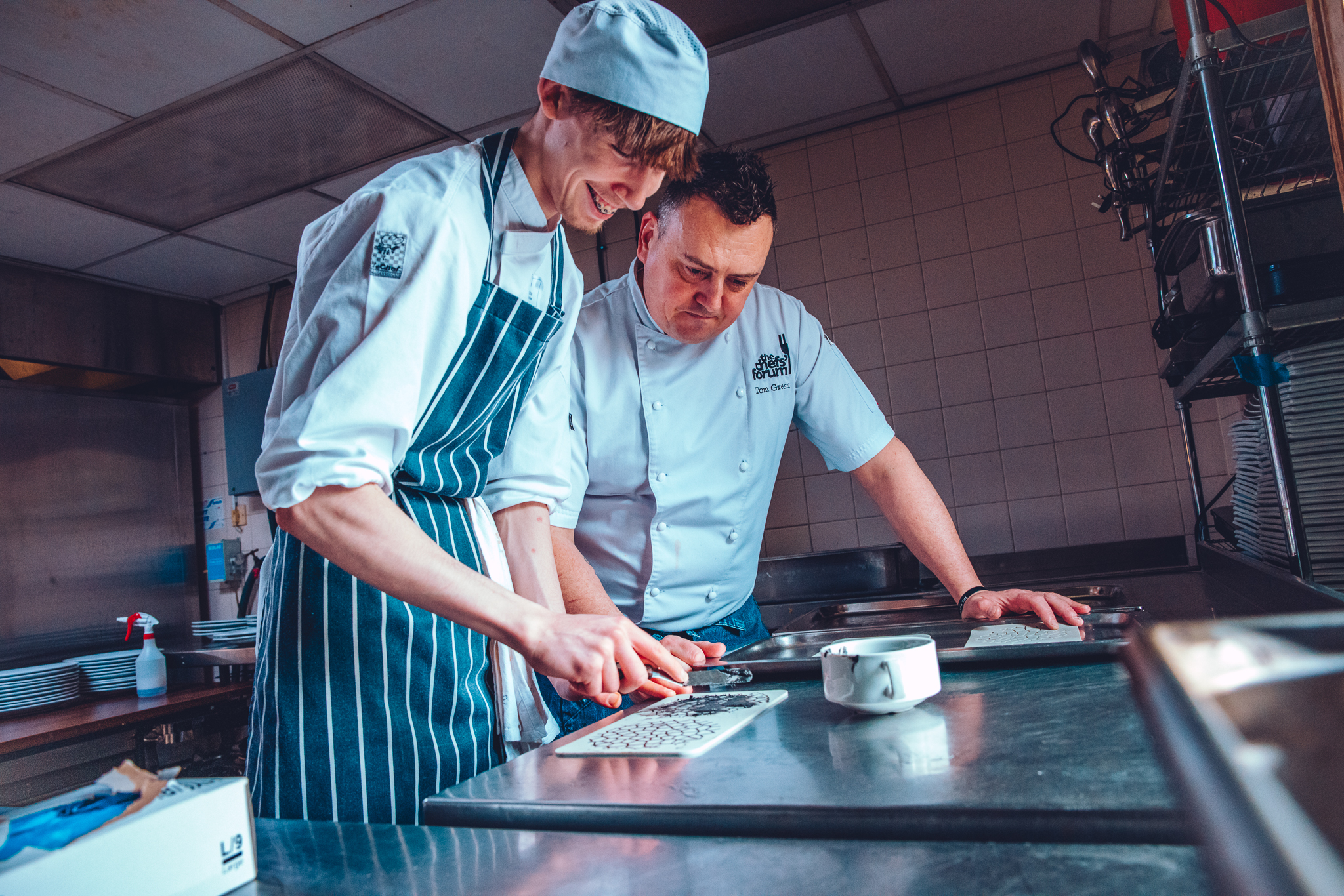 Bristol once again proved why it remains one of the UK’s premier food destinations—and the birthplace of The Chefs’ Forum, which first launched in the city back in 2011.
Bristol once again proved why it remains one of the UK’s premier food destinations—and the birthplace of The Chefs’ Forum, which first launched in the city back in 2011.
On Monday, 10th March, a full house gathered at the Bristol Marriott Royal Hotel to enjoy a spectacular showcase of the South West’s finest culinary talent at The Chefs’ Forum Bristol Lunch.
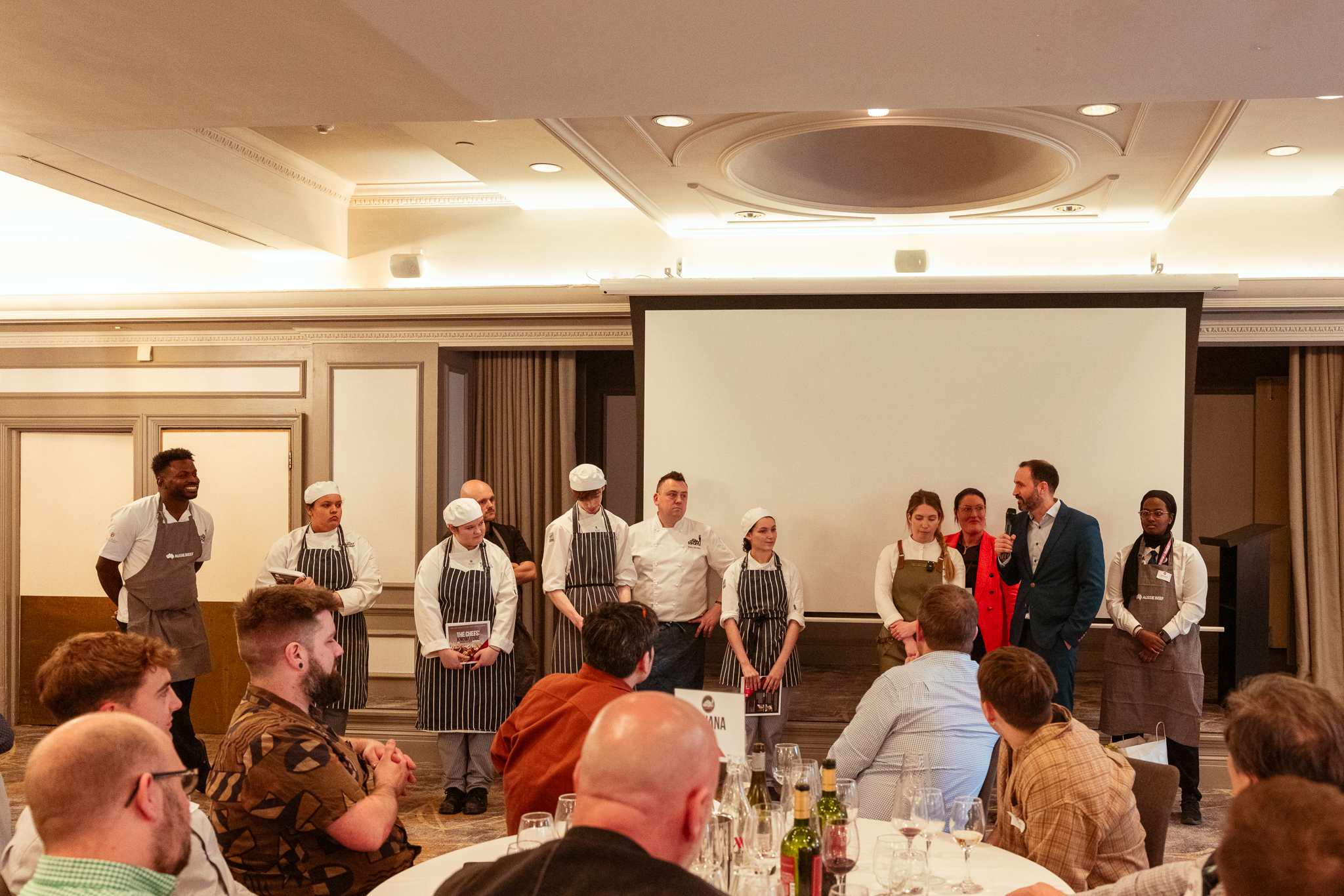 Top local chefs, including Michael Hoskin (Steak of the Art), Tom Green (Private Chef), Cepdia Schrouder (Executive Chef, Bristol Marriott Royal), and Kasae Fraser (Our Table Dining & MasterChef: The Professionals 2023), collaborated with students from City of Bristol College to create an unforgettable, sell-out dining experience.
Top local chefs, including Michael Hoskin (Steak of the Art), Tom Green (Private Chef), Cepdia Schrouder (Executive Chef, Bristol Marriott Royal), and Kasae Fraser (Our Table Dining & MasterChef: The Professionals 2023), collaborated with students from City of Bristol College to create an unforgettable, sell-out dining experience.
General Manager, James Laverick expressed his pleasure at hosting the event, he said
“It is wonderful to see so many local hospitality businesses from across the city represented at today’s Bristol Chefs’ Lunch. The team have really enjoyed having the guest chefs and hospitality students work with them in the kitchen. The standard of food produced was fantastic and it was great to catch up with industry colleagues at such a positive and well-organised event.”
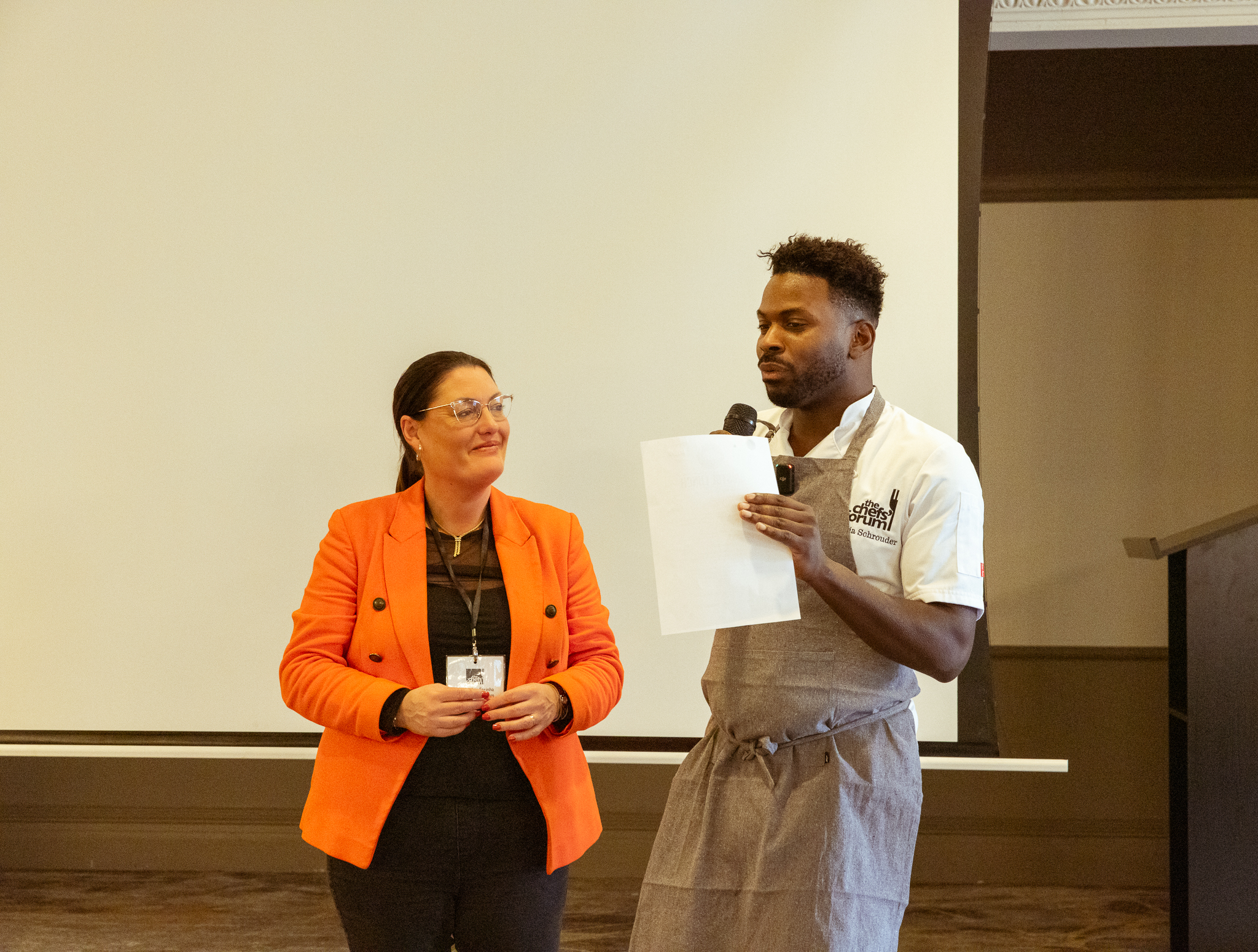 The Chefs’ Forum Director, Catherine Farinha, reflected on the event:
The Chefs’ Forum Director, Catherine Farinha, reflected on the event:
“We always love coming back to where it all began. Bristol never disappoints, and today’s chefs truly put on a showstopper. The lunch was flawless, and it was amazing to see the students’ excitement. They gain so much from these events, and it’s a privilege to help nurture the next generation of culinary professionals.”
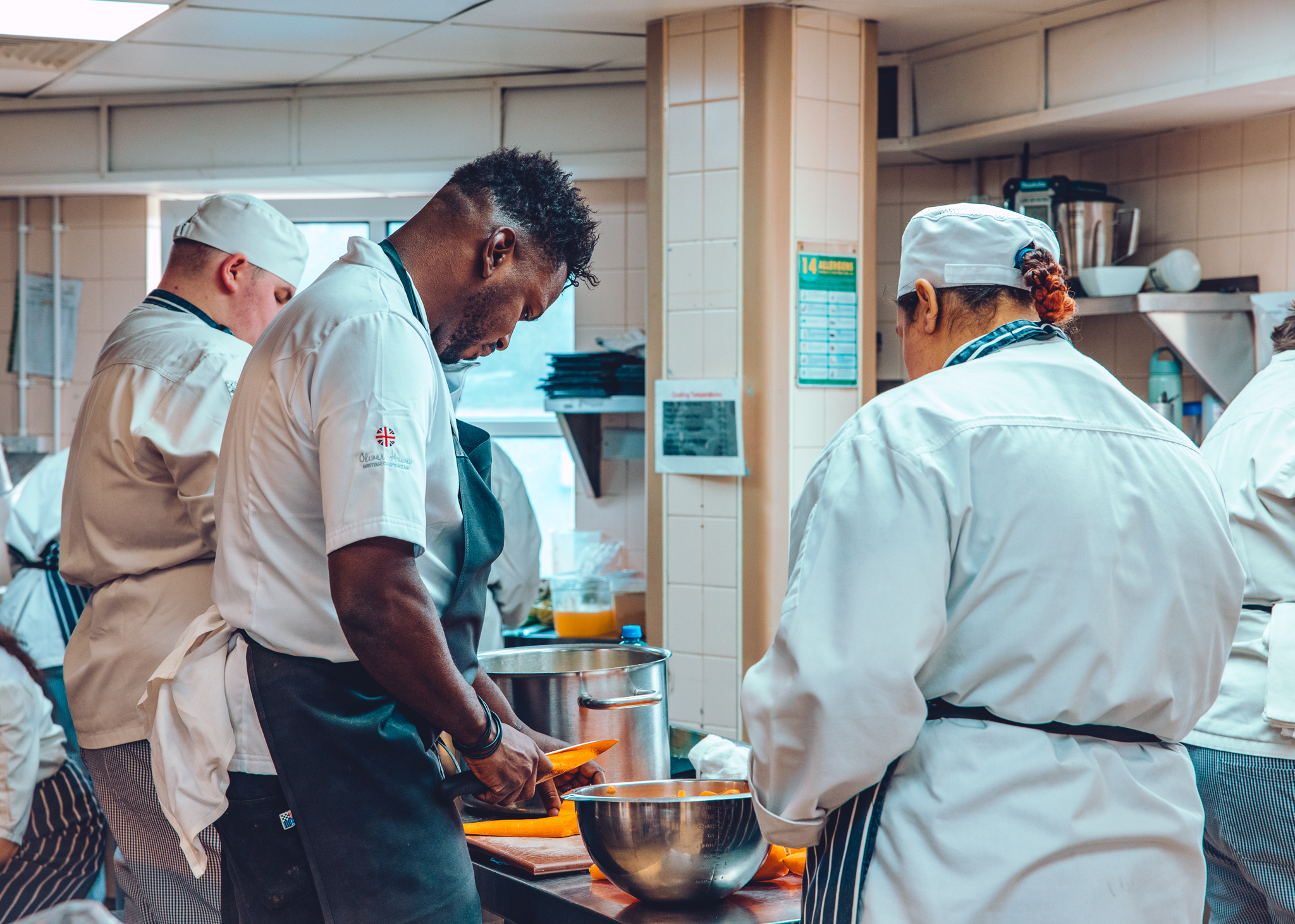 The event also highlighted the impact of The Chefs’ Forum’s work in education:
The event also highlighted the impact of The Chefs’ Forum’s work in education:
“Just recently, one of our colleges told us how much our initiatives enhance student grades and employability, and that was clear to see today.”
Cassandra Williams, from City of Bristol College echoed this sentiment, stating:
“Our Level 2 students had the incredible opportunity to work alongside some serious culinary talent today. It gave them real hands-on experience and a taste of professional kitchens. The skills they’ve learned here will stay with them as they move forward in their careers. Outstanding.”
Each chef was asked to elect a ‘Star of the Day’, an outstanding student, who they thought deserved to be given a copy of The Chefs’ Knowledge – 100 recipes all chefs need to know, so here is a rundown of the chefs, the dish they cooked and their individual ‘Stars of the Day’
The Exquisite Bristol Chefs’ Lunch Menu:
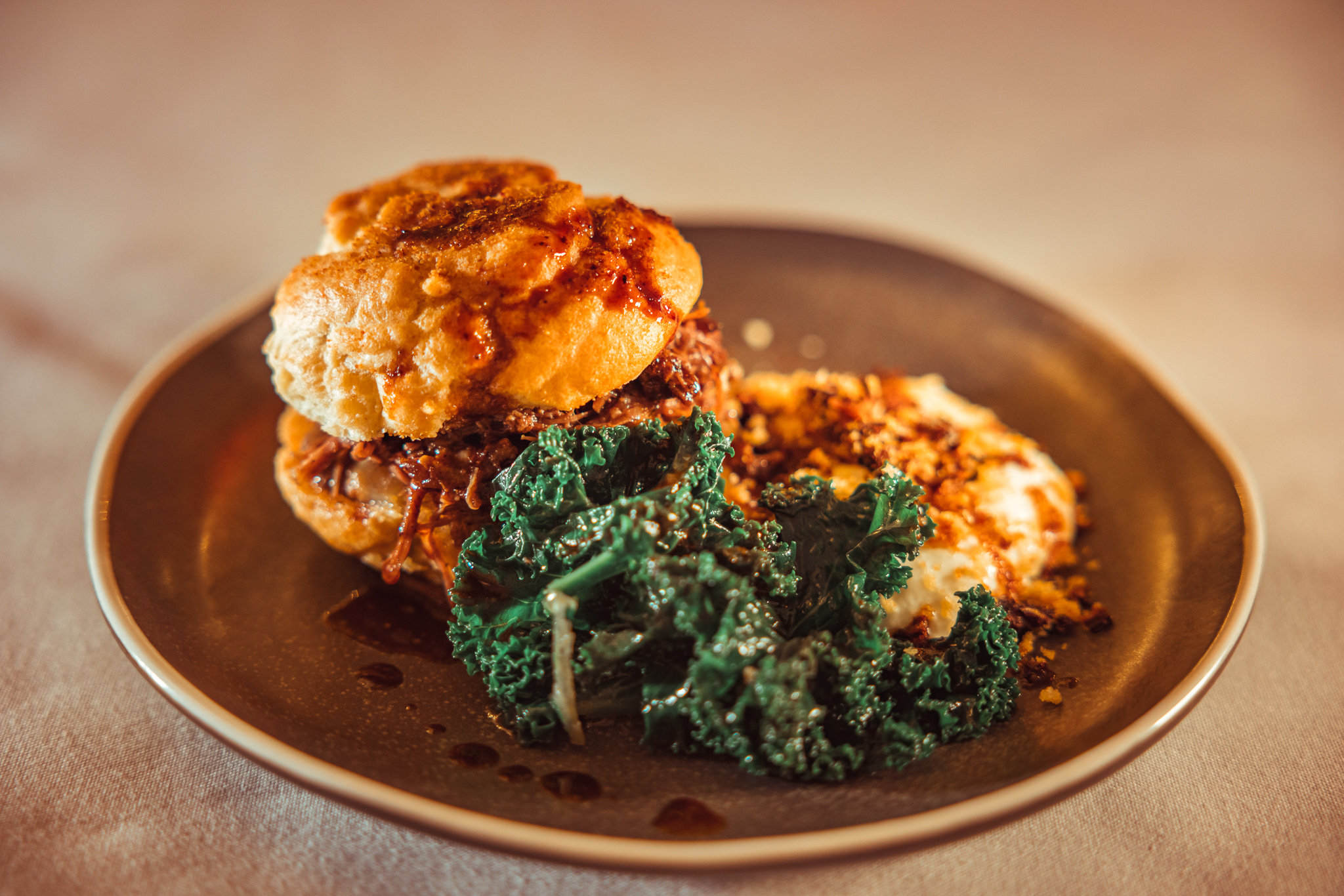 Starter – Michael Hoskin (Steak of the Art)
Starter – Michael Hoskin (Steak of the Art)
Beef fat choux bun, braised Aussie short rib ragu, mushroom ketchup, pickled silverskin onions, Parmesan & horseradish espuma
Star of the Day: Jade Taylor
Jade also managed to secure a trial shift and job interview at The Bristol Beacon on the day, huge congratulations Jade!
Front of House Star of the Day: Maida Mohamed.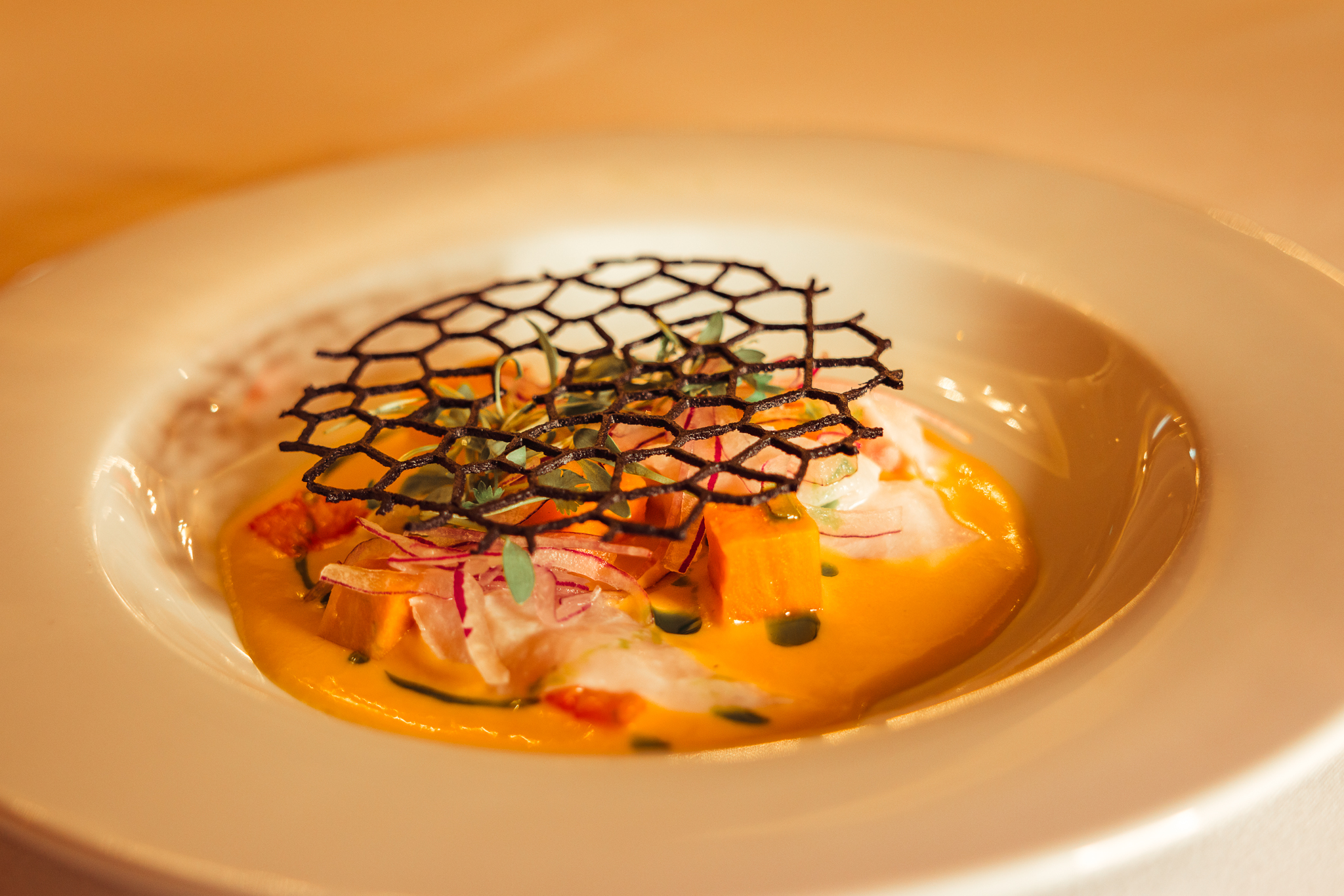
Fish Course – Tom Green (Private Chef)
Sea bass ceviche, tiger’s milk, aji amarillo, blood orange, sweet potato, Ashton Court wild garlic, squid ink coral
Star of the Day: Archie Watson
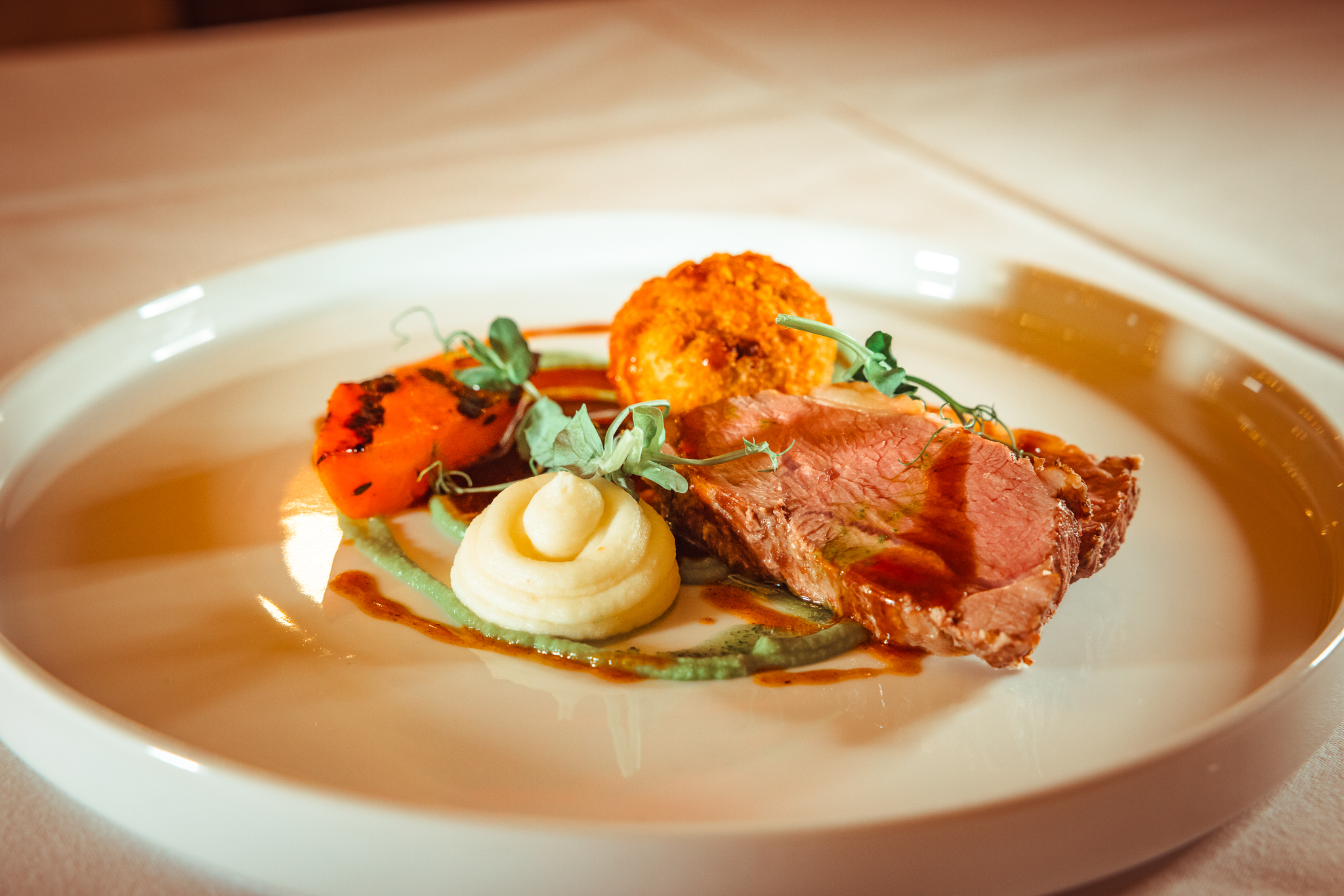 Main Course – Cepdia Schrouder (Marriott Royal Hotel)
Main Course – Cepdia Schrouder (Marriott Royal Hotel)
Aussie lamb rump, lamb bonbon, pea purée, carrot, mashed potato, lamb gravy
Star of the Day: Breanna Robert
 Dessert – Kasae Fraser (Our Table Dining & MasterChef: The Professionals 2023)
Dessert – Kasae Fraser (Our Table Dining & MasterChef: The Professionals 2023)
Brown butter financier, roasted hay & ricotta cream, caramel apples, apple & rosemary granita
Star of the Day: Tanisha Skye Edwards
A special thanks to our sponsors
MCS Technical Products, Aussie Beef & Lamb, Hotel, Restaurant & Catering Show and Dole Foodservice.
Photography & film by Carlos Farinha
NHS England Carbon and Sustainability Workshop at Northampton College
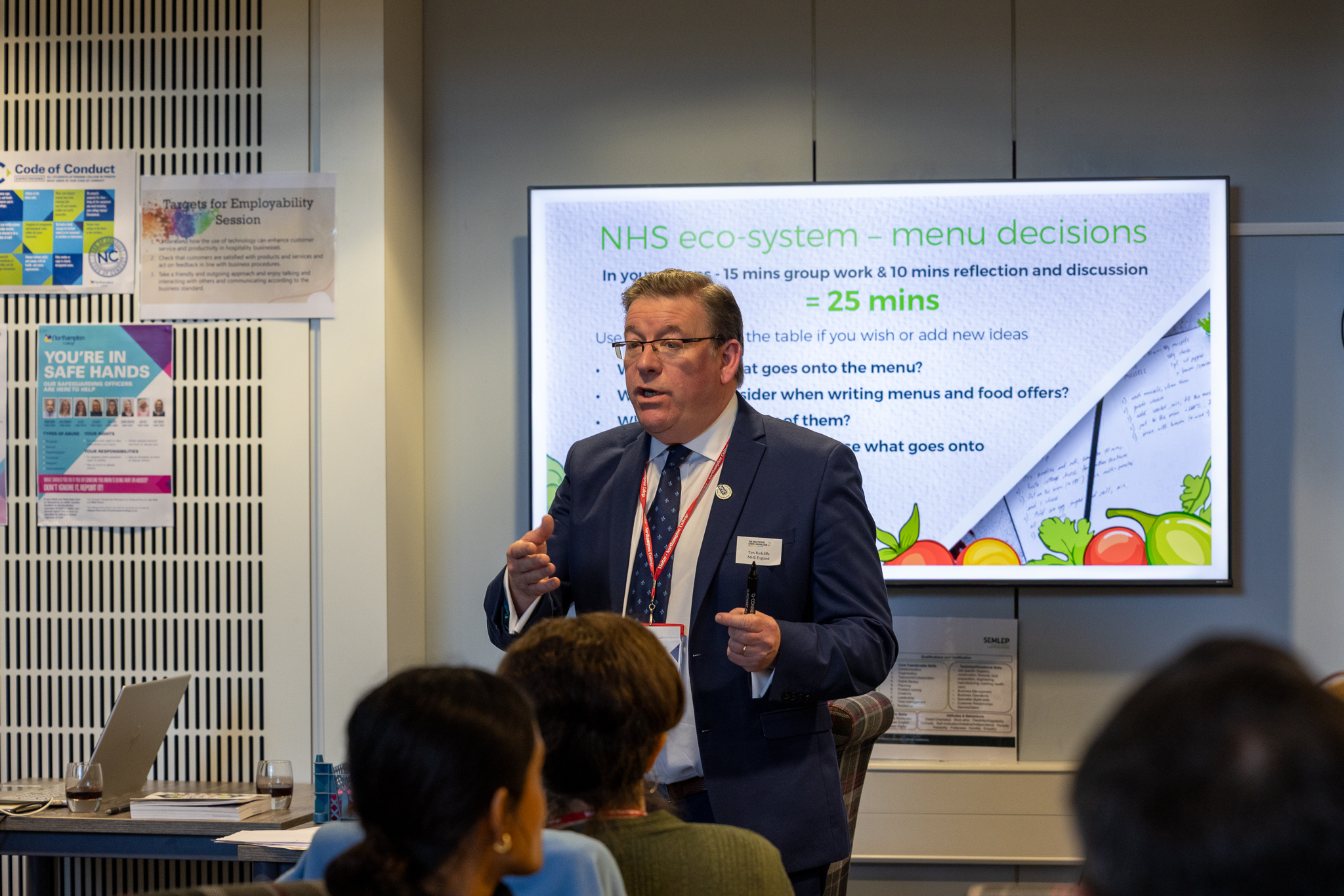 Northampton College Hosts NHS England Event to Inspire Future Healthcare Chefs and formulate future GHGE, carbon reduction strategy with a room full of NHS healthcare foodservice stakeholders.
Northampton College Hosts NHS England Event to Inspire Future Healthcare Chefs and formulate future GHGE, carbon reduction strategy with a room full of NHS healthcare foodservice stakeholders.
The Lane Restaurant and Brasserie, the world-class training restaurant at Northampton College, proudly hosted a special event today in collaboration with NHS England and The Chefs’ Forum. The event brought together students, healthcare professionals, and industry leaders to inspire the next generation of hospital chefs.
The event, held at the college’s state-of-the-art facilities, aimed to showcase career pathways within the NHS England and encourage young people to consider a future in healthcare catering. Attendees had the opportunity to engage with NHS England representatives, participate in a hands-on workshop, and gain valuable insights into the diverse range of roles available in the healthcare foodservice sector.
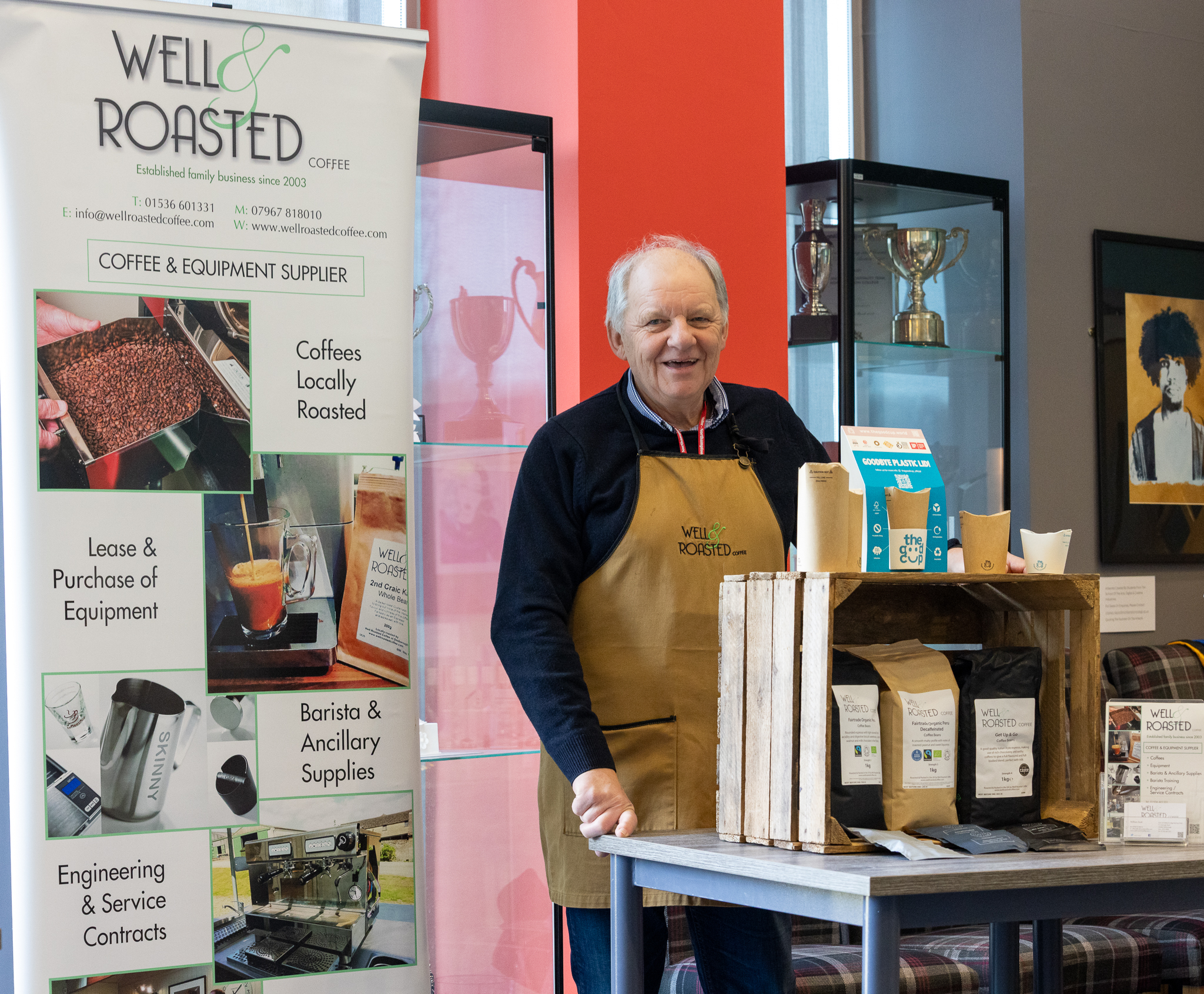
 “We are delighted to have welcomed NHS England Net Zero Leaders, Catering Managers and foodservice stakeholders to Northampton College today,” said Phil Martin, Curriculum Manager for Hospitality and Catering at Northampton College. “This event has provided an invaluable opportunity for our students to explore potential careers within the NHS and gain a deeper understanding of the skills and dedication required to work in healthcare catering. It was also a wonderful opportunity to showcase some local food and drink producers from Northampton Food and Drink including Well Roasted Coffee Company, Houghton Hams, Farrington’s Mellow Yellow dressings, Hargrave Mee Blueberries, Sol Haven & The loving Chef, Moulton Salma Soulful.”
“We are delighted to have welcomed NHS England Net Zero Leaders, Catering Managers and foodservice stakeholders to Northampton College today,” said Phil Martin, Curriculum Manager for Hospitality and Catering at Northampton College. “This event has provided an invaluable opportunity for our students to explore potential careers within the NHS and gain a deeper understanding of the skills and dedication required to work in healthcare catering. It was also a wonderful opportunity to showcase some local food and drink producers from Northampton Food and Drink including Well Roasted Coffee Company, Houghton Hams, Farrington’s Mellow Yellow dressings, Hargrave Mee Blueberries, Sol Haven & The loving Chef, Moulton Salma Soulful.”
Throughout the day, the stakeholders participated in an interactive carbon and sustainability workshop, including recipe formulation activities, blue sky thinking on carbon and sustainability strategy and discussions led by Tim Radcliffe, Net Zero Food Programme Manager at NHS England and Catherine Farinha, CEO at The Chefs’ Forum.
 Tim Radcliffe said
Tim Radcliffe said
“It is very important that we gather our colleagues together to talk about food waste reduction, responsible sourcing and how we can collectively create more sustainable menus within our NHS Trusts. I very much enjoyed delivering today’s session and was impressed with the knowledge and passion in the room. I am really excited for the future and look forward to hearing from the delegates on how they have applied the knowledge shared and acquired today to their individual settings.”
Catherine Farinha added
“We are delighted to be running this series of six Carbon and Sustainability Workshops nationwide, in association with the Net Zero Leads for Foodservice in NHS England. We are also writing a new book, The Healthcare Chefs’ Knowledge 2: Eating The Rainbow, which will largely comprise the content and ideas yielded from the six workshops across six regions of England.”
The Healthcare Chefs’ Knowledge 2: Eating The Rainbow is set to launch at Healthcare Catering Live on the 9th September and will be a valuable resource and recipe bank of 100 sustainable and carbon-friendly recipes that all NHS chefs should know.
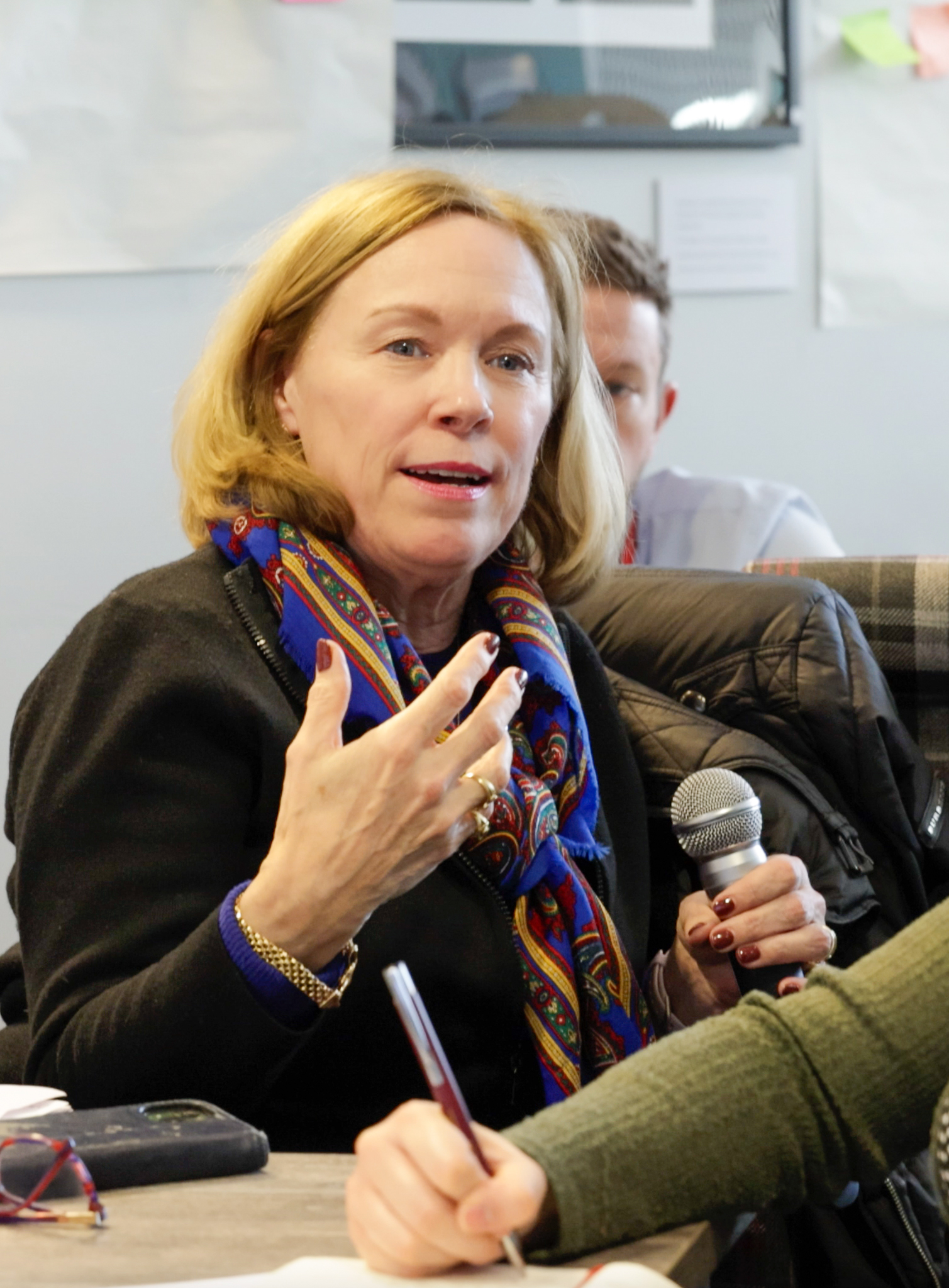
Headline Sponsor, Jacklyn Case, Sales and Marketing Director at NH Case said
“I am truly delighted to be here today, and it has been fascinating to hear about all the ways NHS England is striving to reduce its carbon footprint and enhance sustainability. NH Case has been supplying the NHS for nearly 60 years with a diverse range of sustainable fish species and low-carbon ready meals. It is our pleasure to support this new publication, enabling us to communicate how we can assist NHS healthcare caterers in producing sustainable and delicious meals for patients, staff, and visitors.”
Representatives from NHS England emphasised the importance of inspiring the next generation of healthcare workers, particularly as the industry faces a growing demand for skilled professionals.
“Events held at our colleges like this one are crucial in shaping the future workforce of the NHS,” continued Radcliffe. “We want to encourage young people to consider a career in healthcare catering and demonstrate the rewarding and impactful nature of these roles. Today’s event has been a fantastic opportunity to bring our stakeholders and colleagues together to discuss sustainability, engage with the teaching team and students at Northampton College and highlight the vast career possibilities within the NHS. The students created a beautiful lunch, offering our esteemed delegates the opportunity to enjoy ‘Eating The Rainbow’ and showcasing local wild venison in a beautiful cottage pie, which proved very popular indeed.”
 The event underpinned Northampton College’s ongoing commitment to providing students with valuable career-focused opportunities, supporting local food producers and strengthening its partnerships with key industry stakeholders and employers, this time NHS England and careers in Healthcare Catering.
The event underpinned Northampton College’s ongoing commitment to providing students with valuable career-focused opportunities, supporting local food producers and strengthening its partnerships with key industry stakeholders and employers, this time NHS England and careers in Healthcare Catering.
The lunch was kindly sponsored by producers from Northampton Food and Drink, and made by the students with the NHS chefs – Leanne Turk and Matt Dodds from NHS Supply Chain.
For more information about Northampton College and its hospitality and catering courses, click HERE.
For more information on The Chefs’ Forum, forthcoming Carbon and Sustainability Workshops and the new publication, The Healthcare Chefs’ Knowledge 2, Eating The Rainbow, contact catherine@redcherry.uk.com
Photography & film by Carlos Farinha
Chef of the Week: Brayden Davies, Head Chef at The Box Tree in Ilkley, West Yorkshire
How long have you worked at your current restaurant?
Just over a year.
Where did your passion for cooking come from and where did you learn your skills?
My passion in the kitchen came from working in a kitchen from the age of 14. I was quite fortunate to excel in cooking, so it was a very natural career path. My Grandma was also a very good cook, so it was always something I enjoyed.
What do you enjoy most about being a chef?
I love expressing myself on the plate, experimenting with different flavours and very much telling the guest a story via my food and thought process behind it.
Name three ingredients you couldn’t cook without.
Garlic, thyme and butter.
Which piece of kitchen equipment couldn’t you live without?
A Rational combi oven as they are super versatile and efficient.
What food trends are you spotting at the moment?
I’d say aging fish is a big one everyone seems to do now, also A5 Japanese wagyu beef seems to be absolutely everywhere.
What do you think is a common mistake that lets chefs down?
I think chefs sometimes try to cook for other chefs instead of their customers! Not everyone wants to eat everything weird & wonderful, there is nothing wrong with a classic & I think sometimes people lose what cooking is about… flavour! Not everything has to be fermented.
What is your favourite time of year for food, and why?
For me working & living in Yorkshire, it has to be spring. It’s a great time of the year for things such as spring lamb, peas, wild garlic, allium flowers , wild mushrooms etc. it’s the ingredients in spring that have kept me in the UK for so long, being from Australia.
Which of your dishes are you most proud of?
I’m extremely proud of our current Australian Wagyu dish, it showcases ingredients that are close to my heart in the form of finger lime, Westholme wagyu sirloin and then finished with a surf & turf kind of style tempura Lindisfarne oyster and Exmoor caviar. Basically, just the perfect balance of fat, citrus & salt.
How do you come up with new dishes?
The process is endless really, sometimes ideas come at the weirdest times or sometimes ingredients themselves do the work for you. I find a lot of the time, small things like the dining room itself at The Box Tree inspire me. For example, serving a tea & toast inspire mille feuille based on the bar at The Box Tree as it use to be a tea room.
Who was your greatest influence?
My greatest influence would be my mentor Shaun Rankin, he very much took me from being a good cook and made me into a great chef.
Tell us three chefs you admire.
Shaun Rankin, Brett Graham and Matt Abe.
What is your favourite cookbook?
The French Laundry, still a book I go back to monthly.
Who do you think are the chefs to watch over the next few months?
For me Josh Overington at Myse. It looks like he just keeps turning it up another level with every Instagram I see. His ethos and use of local ingredients is something that inspires me to be a better cook each day.
What’s been your favourite new restaurant opening of the last year?
It has to be Skof, its great to see an amazing chef in Tom Barnes open something in The North in a powerhouse city such as Manchester.
Hospitality Industry Taster Day Inspires 200 West London Students
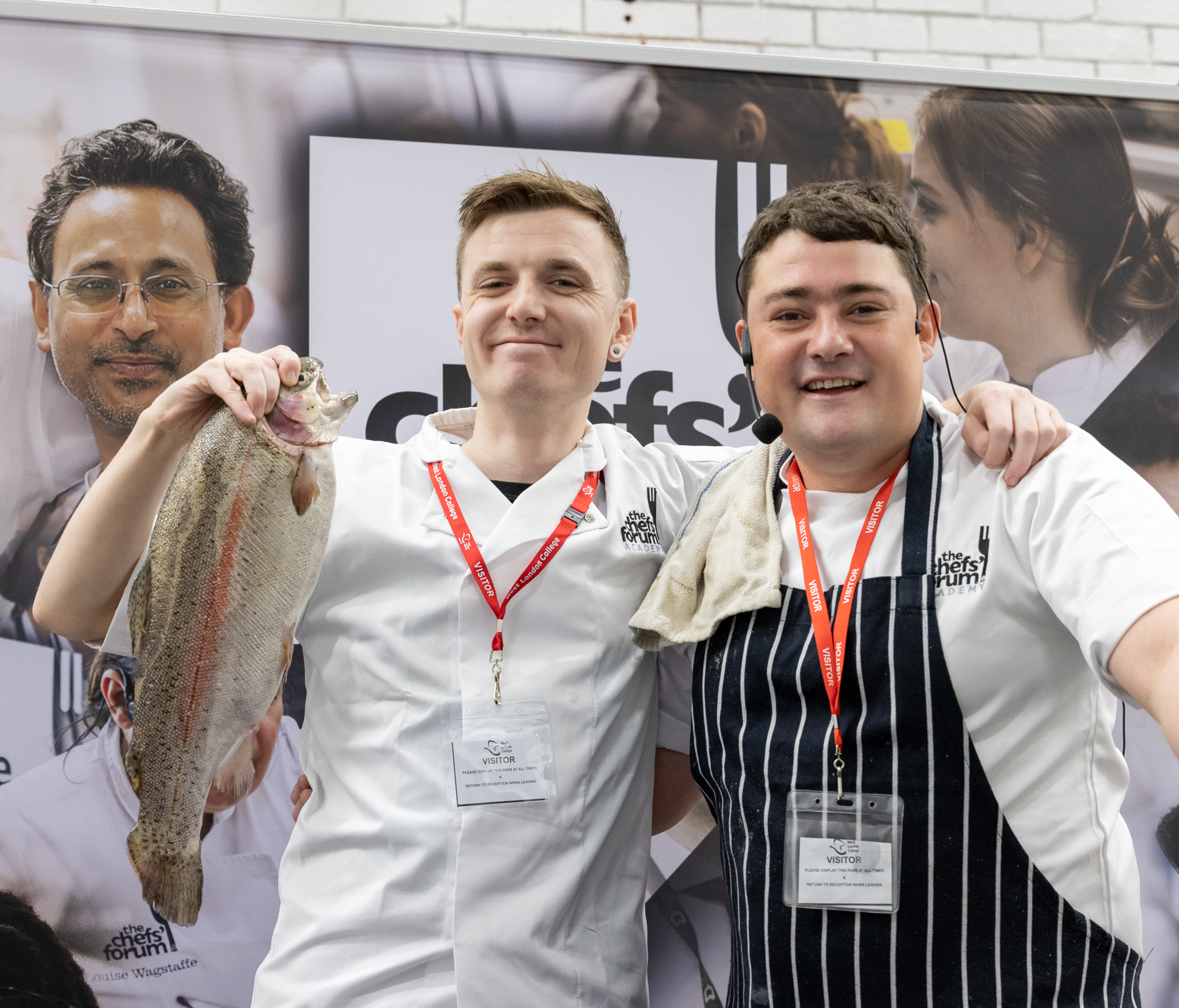 On Tuesday, March 4th, 2025, 200 students from West London College feeder schools experienced the very best of the hospitality industry at a Hospitality Industry Taster Day, filled with live demonstrations and entertainment—proving that when The Chefs’ Forum is given a stage, a spectacular show follows!
On Tuesday, March 4th, 2025, 200 students from West London College feeder schools experienced the very best of the hospitality industry at a Hospitality Industry Taster Day, filled with live demonstrations and entertainment—proving that when The Chefs’ Forum is given a stage, a spectacular show follows!
West London College hosted the special student event, welcoming students from 10 invited schools for an exclusive glimpse into the world of hospitality. The event was opened by Denise Charles, Head of Curriculum for Hospitality and Catering and Vice Principal, Charles Nelson, who welcomed the young visitors along with the Travel and Tourism and Cabin Crew students who gave a safety briefing and told the audience where the toilets and fire exits were located.
 Throughout the day, captivating demonstrations were complemented by outstanding musical performances from Manchester rapper Lowkeylimit and dancers Princess Van-Der-Larbi, and Jake Morgan. The performances energised the young audience, reinforcing the role of music and dance in engaging students of this age group and linking the arts of food and music.
Throughout the day, captivating demonstrations were complemented by outstanding musical performances from Manchester rapper Lowkeylimit and dancers Princess Van-Der-Larbi, and Jake Morgan. The performances energised the young audience, reinforcing the role of music and dance in engaging students of this age group and linking the arts of food and music.
First up on the demo stage was Stephen McClarty, Chef Patron at Sharkbait & Swim, joining forces with Charlie Brockwell from Direct Seafoods London to give a fantastic ‘Fishmonger & Chef’ demonstration. Charlie broke down a whole Chalk Stream Farm trout and then invited Oliver Birkmanis, a year 9 student from Buxton School to help remove the pin bones!
Stephen then created a delicious dish of pan-seared chalk stream trout with palourde clams, sauteed potatoes, samphire and trout roe beurre blanc, which went down a treat with the students as taste tasters. Stephen cooked on CookTek Helios Induction hobs, kindly supplied by MCS Technical Products.
Stephen said to the audience
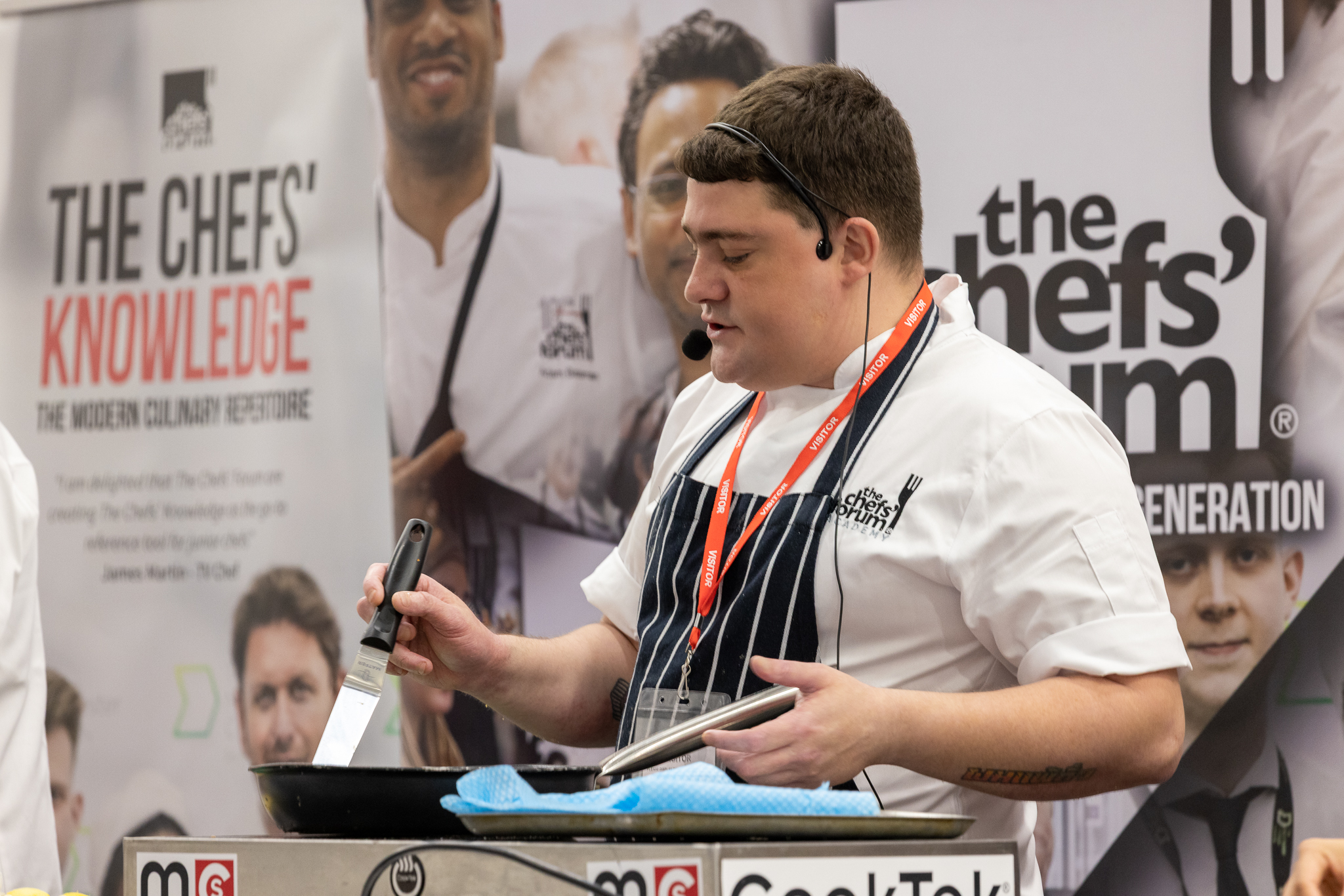 “I have always loved food and cooking and I knew when I was your age that I wanted to be a chef. I really enjoyed working with the students at West London College and can say that if you want to get into the industry, this is the college to go to – A great facility and so lucky to have all the different chefs come into the college as part of The Chefs’ Forum Academy – I wish I had all of this opportunity when I was at college.”
“I have always loved food and cooking and I knew when I was your age that I wanted to be a chef. I really enjoyed working with the students at West London College and can say that if you want to get into the industry, this is the college to go to – A great facility and so lucky to have all the different chefs come into the college as part of The Chefs’ Forum Academy – I wish I had all of this opportunity when I was at college.”
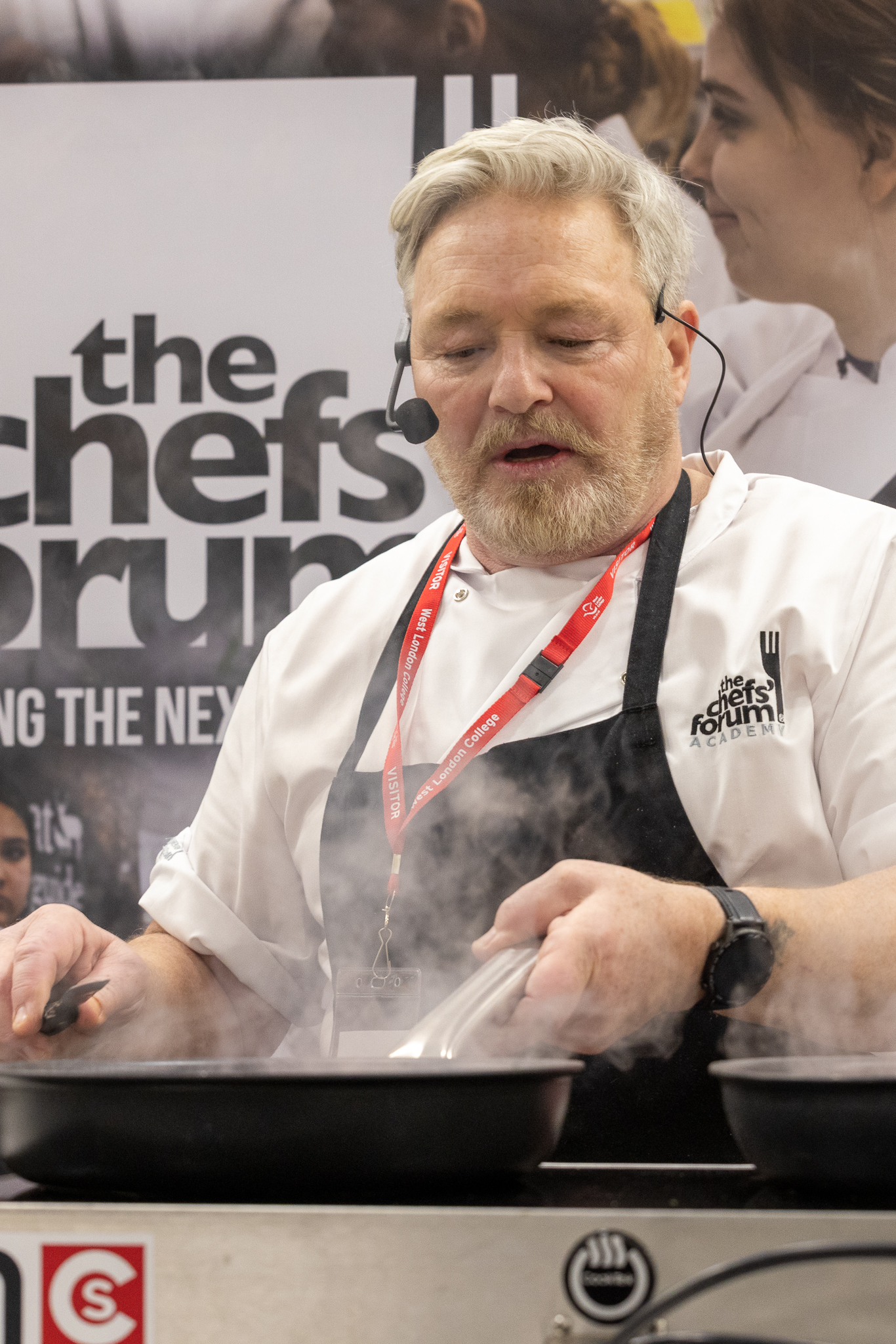 David Jordan, Head Chef at Bonds Mayfair, impressed students by crafting gourmet burgers beyond the ordinary. He invited students to join him in making a smash burger on stage. He also put the Unox Bakerlux convection oven to the test, generously supplied by the market-leading manufacturer, using it to bake beautifully garnished brioche buns with lashings of melted cheese, David’s secret to a lovely juicy burger!
David Jordan, Head Chef at Bonds Mayfair, impressed students by crafting gourmet burgers beyond the ordinary. He invited students to join him in making a smash burger on stage. He also put the Unox Bakerlux convection oven to the test, generously supplied by the market-leading manufacturer, using it to bake beautifully garnished brioche buns with lashings of melted cheese, David’s secret to a lovely juicy burger!
As the demonstrations unfolded, canapé-sized portions of the dishes were distributed to students and pasta pots with Homepride bolognaise sauce were served at lunchtime, kindly sponsored by Premier Foods were served en-masse from purpose-built usherette trays from Thirst Solution.
The interactive event also featured an interactive mocktail demonstration led by National Bar Manager of the Year, Salvatore Maggio, Bar Manager at 5-Star Luxury Hotel, The Franklin, where young guests tried their hand at flaring.
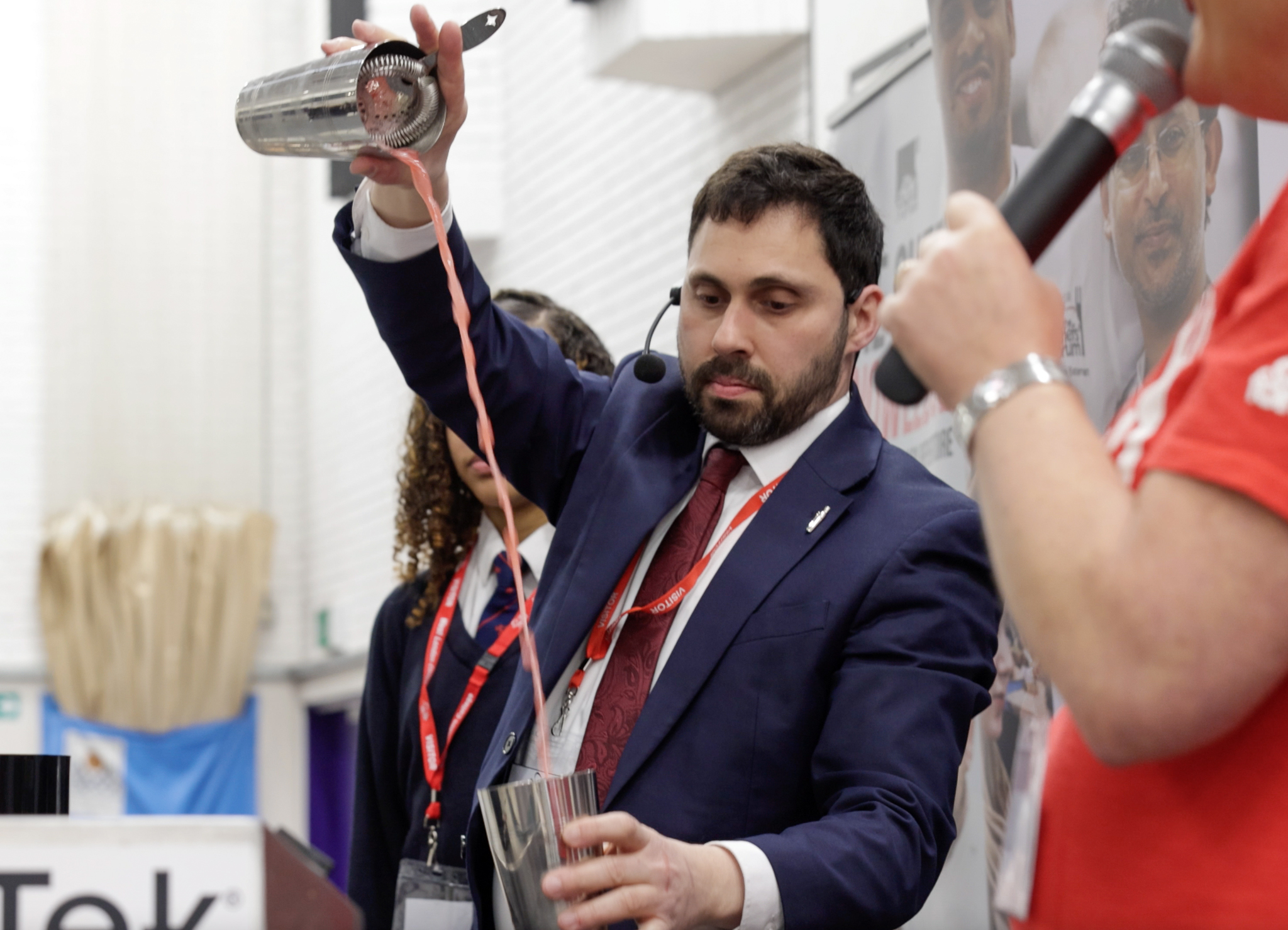
Salvatore said
“I really enjoy sharing my knowledge and skill with young hospitality professionals in the making. Working with the students to create my signature Melody mocktail and a delicious Glory Fizz and Flower Power was really rewarding. I was very impressed with how quickly the students grasped the pouring and flaring techniques I demonstrated and feel they showed real promise – It was great to see!”
Mariela Petkova, Channel Marketing Manager at Premier Foods, reflected on the event:
“The students thoroughly enjoyed today. There was so much to taste and learn about. Premier Foods was delighted to sponsor pasta pots for lunch with our Homepride brand. Since the event ran over lunchtime, it was essential to provide a substantial and nutritious meal alongside the canapés, eclairs and mocktails.”
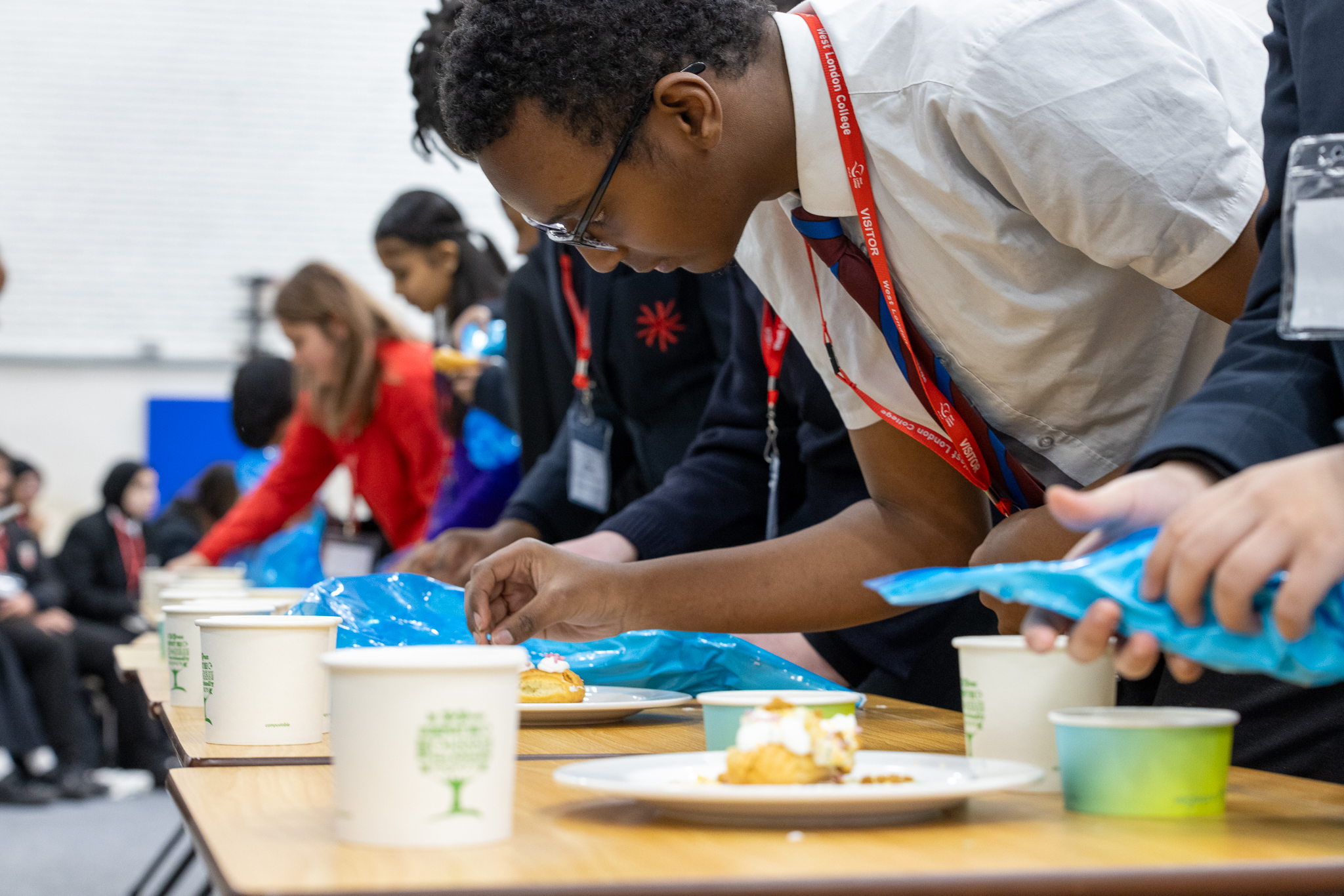
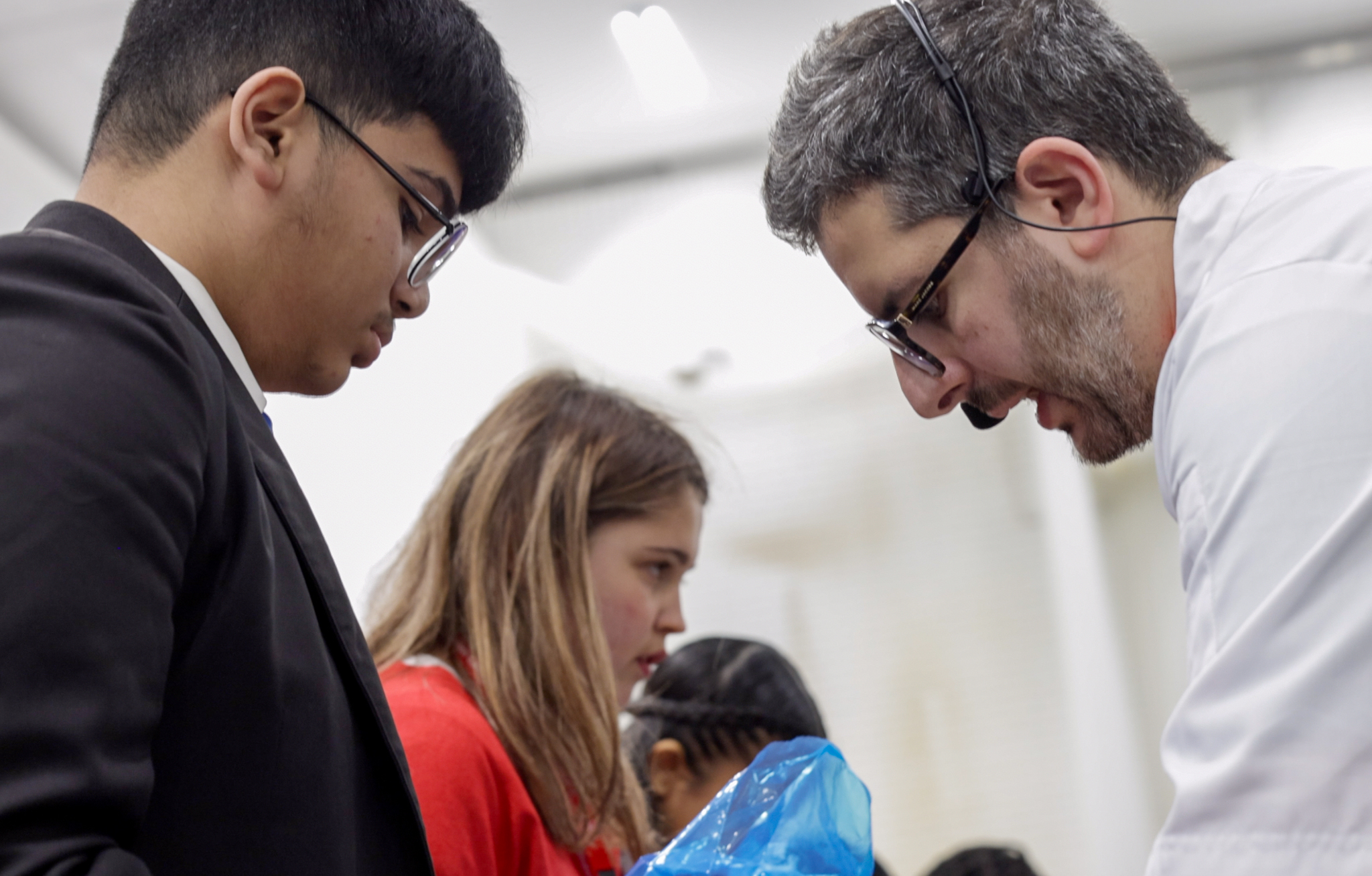
After lunch, an inter-school éclair filling and decorating competition, led by Bake Off: Professionals Winner, Mauro Di Leito ensued. This is an annual tradition, and the students got to be really creative!
Mauro was joined by new Executive Chef at The RAF Club, Elliot Plimmer and Franciane Tartari, our Joint Head Judge for Student Pastry Chef of the Year to judge the competition – There were so many excellent creations!
Denise Charles, Head of Curriculum at West London College, also shared her enthusiasm:
“We love hosting these taster days in partnership with The Chefs’ Forum. They offer school students a chance to visit the college and gain insight into the industry-leading establishments we work with. It was fantastic to collaborate with Stephen, Charlie, David and Mauro. The cocktail demo with Salvatore also added great excitement.”
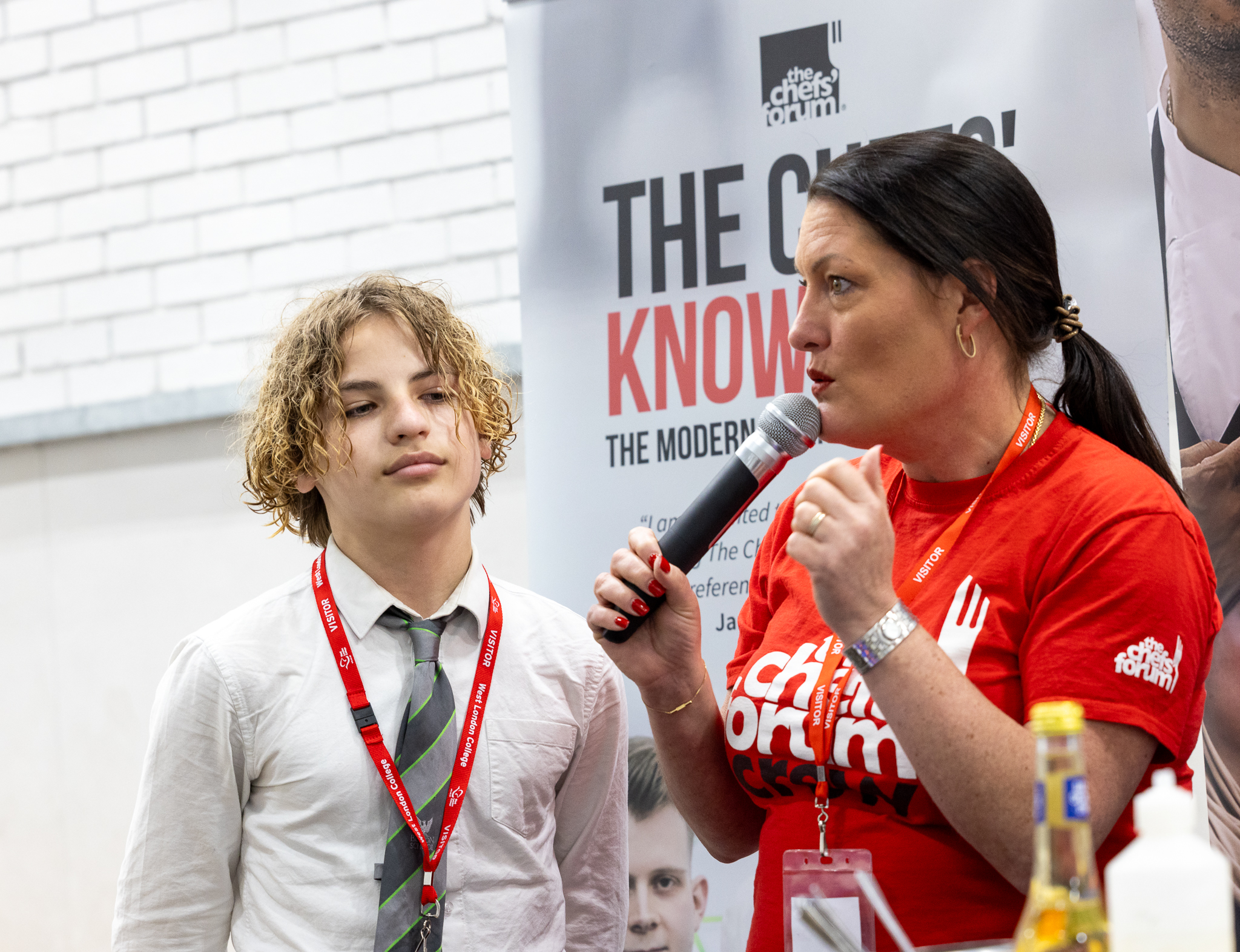 Catherine Farinha, Director of The Chefs’ Forum, extended her gratitude:
Catherine Farinha, Director of The Chefs’ Forum, extended her gratitude:
“A huge thank you to all our participants and to West London College for their continued support. Stephen and Charlie were a great double act and Salvatore and Mauro also delivered an outstanding morning. We love bringing in top professionals from the best hotels and restaurants to inspire high school students and drive college registrations year on year. This is what the Chefs’ Forum Academy is all about.”
Students who participated in the demonstrations were rewarded with a complimentary copy of The Chefs’ Forum’s book, The Chefs’ Knowledge, as a new print run is now available to buy HERE.
The event also celebrated past students as success stories, alongside current students who had previously attended similar taster days. These initiatives are proving highly effective in increasing college enrolments each year, contributing to solving the ongoing chef shortage.
The Chefs’ Forum is actively expanding its network of Chefs’ Forum Academies across the UK and welcomes opportunities to stage similar events at further education colleges nationwide.
Photography & film by Carlos Farinha
